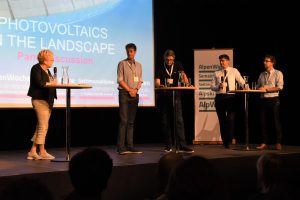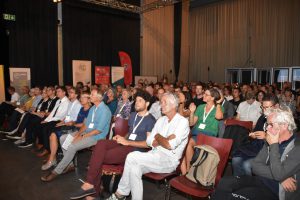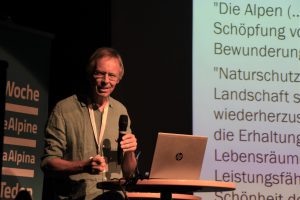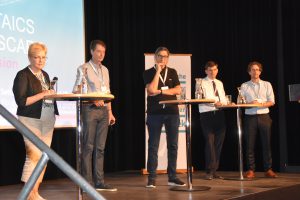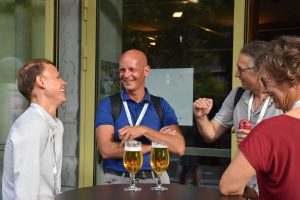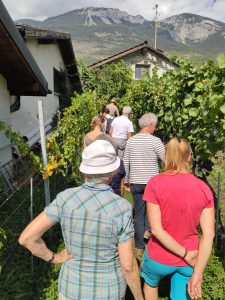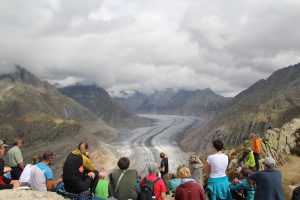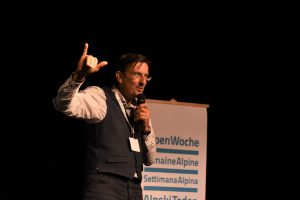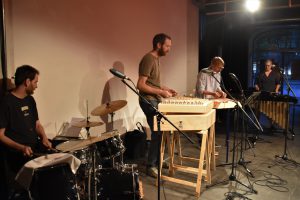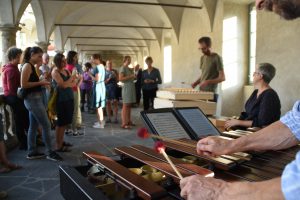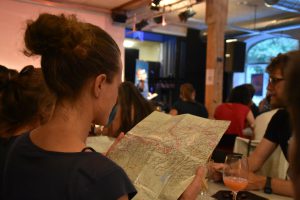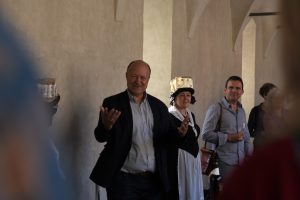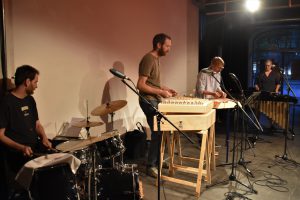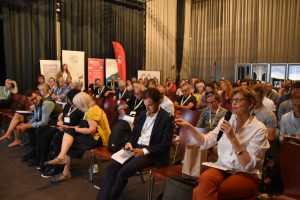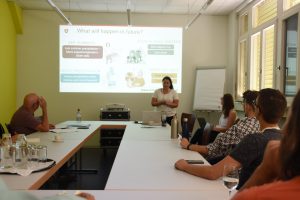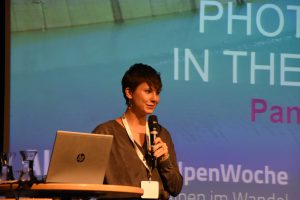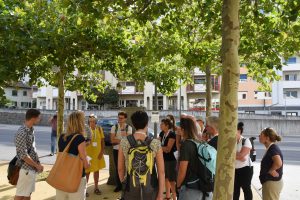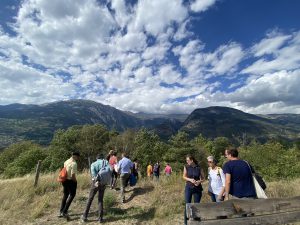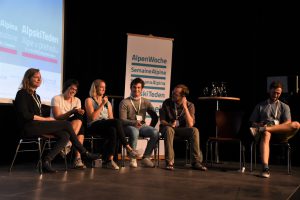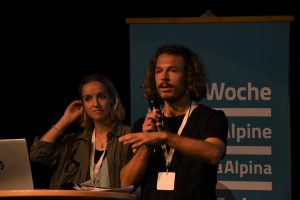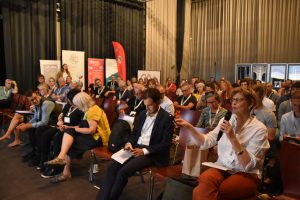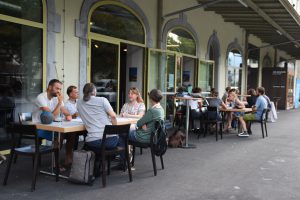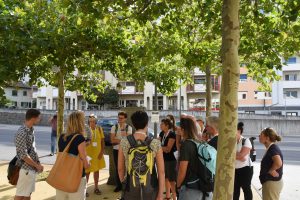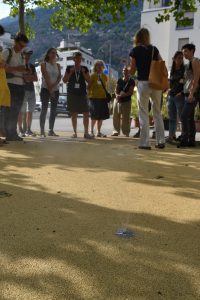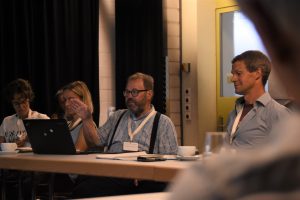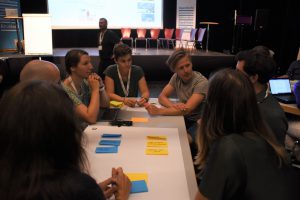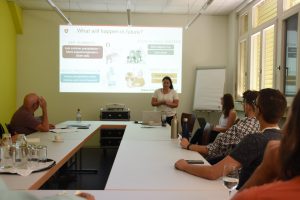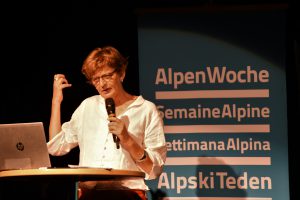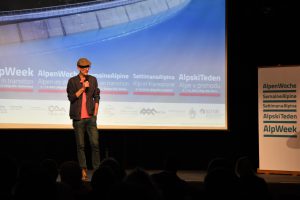Detailed program in all languages below
Program 2022 EN
MONDAY, 5.9.2022
11:30-18:00
Half day excursion
at Brig station
Brig lies at 700 metres, at the starting point of the Simplon Pass (2005 m.a.s.l.), which leads across the Alpine ridge to Domodossola (300 m.a.s.l.). It has for centuries been an important transit route linking the Valais with northern Italy. With the influence of the arch-capitalist and politician Kaspar Stockalper (1609 – 1691), the old mule track became an important European trade route. It was used to transport just about anything that could fit on a pack animal and promised profit and income. Today, more than 11’000 heavy lorries with dangerous goods a year roll over the Simplon Pass, despite the railway tunnel below, which was built in two stages about 100 years ago.
Our excursion takes us to this hotspot of Alpine traffic problems, combining the up-close experience of an imposing mountain and traffic landscape with expert input, from the history of the pass route full of smuggling adventures to today’s pressing traffic issues. The excursion also serves to publicise a petition by various NGOs in the Alpine region demanding that dangerous goods transports on all Alpine routes be shifted from road to rail – not only, but in particular also on the winding Simplon road.
Route: After a bus ride to the top of the Simplon Pass, we will hike back towards Brig, with stops along the way to learn about the exciting background of this impressive Alpine transit route in short input speeches and discussions.
Important: The hike leads along good hiking trails, but sturdy shoes and adequate equipment (weatherproof mountain jacket, warm clothing) are necessary.
Languages: DE and EN
Organiser: Alpine Initiative & CIPRA International (kaspar.schuler@cipra.org)
Schedule
11:36 Brig station: Public bus in direction of Domodossola, we leave bus on Simplon Pass (please buy your own ticket Brig – Simplon-Pass)
12:12 Arrival on Simplon Pass and lunch from backpack (please bring your own)
13:00 Hike with short input speeches and discussions from Simplon Pass to Brig on the ViaStockalper
17:30 Arrival in Brig
18:00 Apéro at Stockalper Palace on invitation of the municipality of Brig-Glis, followed by AlpWeek evening-program
Festive Networking Evening
18:00
19:00
Celebration of 20 Years Via Alpina
Join us on a hike along the Via Alpina. We look forward to an evening full of anecdotes, pictures and stories of the transalpine hiking trail.
Language: EN
Organiser: CIPRA International
at Zeughaus, Saal 1
TUESDAY, 6.9.2022
08:30-09:20
Registration – Coffee
09:30-09:45
Greetings and Introduction
09:45-10:45
Keynote 1: Grassroots innovations in the French Alps. Which potential for regional socio-ecological transitions?
Language: translated into DE, FR, IT, SLO
Speaker: Kirsten Koop
Social initiatives envisioning sustainable transitions have been mushrooming in the French Alps during these last two decades. They are embedded in translocal networks which foster the transfer of know-how and mutual aid. This keynote will delve into levers and obstacles for broader regional transitions triggered by such grassroots innovations.
Keynote 2: Upper Vinschgau Citizens’ Cooperative
Speaker: Armin Bernhard
The motivation of the founders of the cooperative lay in their common endeavour to shape a sustainable future for the Upper Vinschgau region. The goal of the Obervinschgau citizens’ cooperative is an ecologically and economically sustainable development of the valley. Peripheral rural areas are at a disadvantage compared to the centres in today’s social development. For this reason, it is important to take a different direction. Not to continue developing efficiency, competition and consumption strategies, but to build on resilience, cooperation and diversity. The initiators are united by the common will to create a sustainable region and to solve local needs and difficulties. The cooperative builds on the people and resources of the region, strengthens local cycles and social cohesion.
Organiser: CIPRA International
10:45-10:55
Coffee Break
11:00-12:30
Youth from all over the Alps will present 4 different projects and studies. A breath of fresh air that will open the alpine week debates
Language: Translated into DE, FR, IT, SLO
Organiser: CIPRA Youth Council (CYC) (louis.didelle@cipra.org)
12:30-12:45
12:45-13:55
Lunch Break
14:00-15:30
Brig-Glis is a good example of how Alpine cities could use and valorise the abundant water in mountain areas. Water can be used to cool the increasingly hot urban areas, for urban design, as a tourist attraction and much more. In the alpine environment, it is usually available in abundance.
Various impulse presentations on water as an urban planning element; urban climate: the central role of water; water in Alpine towns: displaced, tolerated, integrated – practical examples and a short portrait Brig-Glis will lay the foundation for the subsequent workshops.
During a tour of the city of Brig-Glis in the second round of parallel workshops (Session 2/part 2), the topic will be explored in greater depth.
Language: EN
Organiser: Alpine Town of the Year
-

- Sustainable tourism
-

- Renewable energy and landscape
Language: FR, DE, EN, translation in DE, FR, IT, SLO
Organiser: For the Forum Landscape, Alps, Parks:
Jörg Balsiger, University of Geneva
Marcel Hunziker, Swiss Federal Institute for Forest, Snow and Landscape Research (WSL)
Carolina Adler, Mountain Research Initiative MRI
Dr. Christine Jurt Vicuña Muñoz, School of Agricultural, Forest and Food Sciences HAFL
What are the relevant labels that distinguish sustainable destinations in mountain tourism? What is their underlying philosophy? What do they bring in concrete terms?
More and more labels are being introduced in tourism, at the business level, but also at the destination level. Some are explicitly focused on tourism, others go beyond that, such as the two mountaineering villages newly introduced in Switzerland in 2021 or “Gewässerperlen plus”. The aim is 1) an overview and comparison of existing labels at the level of Alpine destinations, 2) a more detailed presentation of 2-3 labels, in particular the Mountaineering Villages initiative, and 3) a critical reflection on the possibilities and limits of labels.
Language: DE, possibly EN
Organiser: Swiss Alpine Club
Speakers:
Philippe Wäger, Swiss Alpine Club
Fadri Guidon, President of the municipality Bever
Hans-Christian Leiggener, Director UNESCO Welterbe Schweizer Alpen Jungfrau-Aletsch
Simona Barmettler, Sedrun Disentis Tourism SA
Agricultural surface in the Alps and other European mountain regions is to large parts grassland or rangeland, which can be utilised exclusively by herbivore livestock. As a resource for sustainable animal production these pastures are extremely valuable, yet the necessary labour input is high, which leads to their continuous abandonment and subsequently encroachment. In the light of urgent needs for more ecological and climate friendly agricultural production schemes, we need to reassess the role of animal husbandry in mountain regions for food production, ecosystem services and, not the least, animal welfare. In the workshop we will discuss the general significance and challenges of mountain pasturing in Europe, and we will hear and discuss the hands-on experience of Swiss alpine dairy farmers.
Language: DE or EN
Organiser: Franz Steiner, Research Institute of Organic Agriculture, FiBL, Switzerland
Alain Gisiger-Perrier (Farmer)
15:30-15:55
Coffee Break
16:00-17:30
In the midst of the city of Brig-Glis, the participants will deepen the topics discussed in the first part of the workshop by means of concrete aspects in small groups. Among the topics are:
– Regarding the practical implementation of water as an urban planning element: What is Brig-Glis doing? What is being done elsewhere? What are the concrete benefits? Where are the stumbling blocks in the implementation?
– Assessment of the “water situation” and recording of the urban climate on the basis of selected quarters of Brig-Glis: concrete assessment parameters and measurement methods.
– How can society and politics be won over for the topic of “water in the city”? How can a step-by-step participation process – being informed, having a say, co-deciding, participating – be set in motion? What best practice experiences are there?
Followed by a synthesis and final discussion with Monika Holzegger and Rolf Weingartner
Language: EN
Organiser: Alpine Town of the Year
-

- Sustainable tourism
-

- Renewable energy and landscape
Local and innovative solutions to improve energy efficiency: the use of biomass, microgrids and e-mobility solutions.
Energy efficiency being one of the Interreg Alpine Space core priorities, we will further explore this topic in our workshop focusing on local and innovative solutions to improve energy efficiency: the use of biomass, microgrids and e-mobility solutions. Based on the results and experiences of the Alpine Space projects ALPGRIDS, BB-CLEAN and e-SMART, we will see how local solutions in the Alpine cities and rural areas can make a difference to the energy transition at Alpine level. The discussion will then focus on the challenges posed by the implementation of these solutions (political and citizen support) as well as on the broader issues at stake, such as energy sufficiency. Participants to the workshop will be able to share their experiences and ideas on how to overcome these challenges.
Language: EN
Organiser: Interreg Alpine Space
-

- Renewable energy and landscape
What will drive us up the wall when we sow rye in 2050? Will crops and alpine cattle thrive better in the forested semi-shade in the future? In the workshop we want to think together about the future and address the aspects that are essential for us participants in adapting alpine farming, mountain farming and mountain forestry to changing climate conditions. We all know that various established balances are shaken. That is why we want to bring together participants with different forms of knowledge and experience, gather our knowledge, formulate hypotheses, discuss connections and interrelationships, and explore possible opportunities and limits. We will design the exchange process along the 5 steps from the Problem Based Learning method, which our students at BFH-HAFL use to set up their learning processes. Through structured moderation, we hope to be able to present some essential questions for the future in “greener Alps” at the end.
Language: DE (+EN in case of more than 10 participants), translation in DE, FR, IT, SLO
Organiser: Karin Zbinden, Hochschule für Agrar-, Forst- und Lebensmittelwissenschaften HAFL
-

- Agriculture and biodiversity
How can we envision ecological and social transitions as a whole, from an interdisciplinary perspective, rather than from sectoral approaches.
In the 2020-2024 program of LabEx ITTEM, the approach to the notion of transition is correlated with that of innovation in order to question the continuous re-evaluation of models and norms of contemporary societies through the prism of theories of change. In the face of major environmental, climatic and energy challenges, against the backdrop of the preservation of the planet’s habitability, the very conception, scope and intensity of this transition are being debated: is it a horizon of reform that will make it possible to ‘green’ modes of production and life, while maintaining the presupposition that the solutions being sought must not restrict economic growth? Or, on the contrary, is it a process of profound transformation at the political and economic levels, but also at the cognitive and cultural levels?
In this respect, mountain regions – at different scales and in very contrasting contexts – are particularly suitable fields of study and a scientific object, not only because of the accentuation of environmental crisis phenomena, but also because of social resilience processes. Ecological and climatic vulnerability, physical constraints, mobility and access to services, economic and residential attractiveness dependent on natural, cultural and heritage resources, and the accentuated seasonality of activities are some of the major characteristics. The emergence of the mountain as a transnational and transcultural common good is thus to be put in perspective with the evaluation of the demonstrative value of the socio-ecological experiments observed in the mountains, and to contribute to their transferability.
Language: EN
Organiser: For ISCAR Alpine Research:
Thomas Spiegelberger, INRAE, French National Institute for Agriculture, Food and Environment
Raffaela Balzarini and Carine Pachoud, LABEX ITTEM, Innovations et transitions territoriales en montagne
Co-create with us – the future network and story of the long-distance hiking trail Via Alpina!
The transalpine long-distance hiking trail “Via Alpina” celebrates its 20th anniversary in 2022 as an official implementation project of the Alpine Convention. A hike along the Via Alpina makes alpine-wide challenges such as climate change, pressure of use and rural exodus tangible. But it also shows solutions such as sustainable building culture, slow tourism and innovative projects of local populations. After 20 years, the network around the Via Alpina will be reactivated to enable alpine-wide projects along the trail and to maintain its existence as a form of soft tourism.
We will look into the future of the Via Alpina. How should a network in 2022 look like? Who needs to take part? And how? A joint workshop round will bring together interested organizations, partners, and individuals from the entire Alpine region to clarify needs and allow joint projects and collaborations to emerge.
Language: EN
Organiser: CIPRA International
-

- Sustainable tourism
18:00-19:45
Dinner
20:00-21:30
The panel discussion is open to the public. No registration necessary.
Language: DE (translated into EN, FR, IT, SLO)
Photovoltaics will be the absolute focus of the expansion of electricity production capacities in Europe in the coming years. The electricity can be produced cost-effectively, CO2 emissions are reduced. The potential is enormous – and in the Alpine region in particular, it could be used to produce a high proportion of the missing winter electricity. What about large-scale ground-mounted systems? Can they be realized in a way that is compatible with the landscape, and what is the legal situation?
This question will be discussed by experts from science and practice with different perspectives among themselves and with the audience. Raimund Rodewald, Managing Director of the Swiss Landscape Conservation Foundation, will begin with an input from the perspective of spatial planning, biodiversity and landscape.
Input: Raimund Rodewald, Managing Director, Swiss Foundation for Landscape Conservation
Statements and panel participants:
Markus Schreiber, lawyer, University of Lucerne, perspective of spatial planning law
David Stickelberger, managing Director, Swissolar, perspective of the photovoltaic industry
Renato Jordan, Initiator Gondosolar, Perspective Initiator of a ground-mounted system in the Valais Alps
Boris Salak, Social Sciences in Landscape Research, Swiss Federal Institute for Forest, Snow and Landscape Research (WSL)
Moderation: Catherine Duttweiler, Journalist
Organisers: Forum Landscape, Alps, Parcs (folap@scnat.ch), CIPRA Switzerland (schweiz@cipra.org) & Swiss Alpine Club SAC (Lucie.Wiget@sac-cas.ch)
-

- Renewable energy and landscape
WEDNESDAY, 7.9.2022
09:00-12:00
Morning Program of the CYC – closed for public
How can climate change be made visible in the region of Brig?
A cross border exchange between young people from Brig and the CIPRA Youth Council to make climate change artistically visible in the region – in cooperation with the ClimateFresk
09:45-17:00
Full day excursion
at Brig station
In the Aletsch region, the effects of climate change are already very visible. On this excursion we will look at the effects on the landscape, flora, fauna and people of the region and what measures will be necessary as a result.
Description: One effect of climate change in the Alps can be observed particularly well – glacier retreat. Taking the Great Aletsch Glacier as an example, we will look into the future of the ice giant and ask ourselves what other consequences the melting will have for the landscape and the people of the region.
But it is not only the glaciers that are affected by climate change. Consequences are also to be expected or already observable for the flora and fauna of the Alpine region.
Planned tour: The excursion will bring us to the Moosfluh with its beautiful view on the Aletschgletscher. From there we will walk through the Aletsch forest known for its old trees to the Villa Cassel. From there we will go back to Brig.
Important notice: Good shoes are recommended. Costs 30€/CHF
Language: DE or EN
Organiser: Pro Natura Zentrum Aletsch, Maurus Bamert, Director and CIPRA Switzerland (schweiz@cipra.org)
09:48 Brig train station: Postbus to Mörel (independent)
10:03 Mörel: cable car ride to Riederalp Mitte (independent)
10:15 Riederalp Mitte: Welcome and introduction by excursion guide
10:30 Moosfluh valley station: cable car ride to Moosfluh
15:20 Villa Cassel: End of excursion
16:00 Riederalp West: Return journey to Brig
09:00-10:30
Migration, Youth & Participation – Whether characterised by structural weakness and migration or by one-sided developments in tourist hotspots – a large part of alpine communities is confronted with a strong demographic change and the associated limited opportunities for social exchange.
After an input on demographic developments & trends in peripheral regions, we want to discuss local experiences, challenges, and strategies of the participants concerning immigration, diversity, as well as integration, and participation with an emphasis on young people.
Language: EN
Organiser: Alliance in the Alpes, Elisabeth Gruber, Humboldt Stipendiatin Friedrich-Alexander Universität Erlangen-Nürenberg FAU
-

- Demographic change
Opportunities and challenges of renewable energies between planetary boundaries and local interference in the biosphere.
The energy transition – which implies decarbonisation of energy production and the eventual abandonment of nuclear energy – requires the development of new renewable energy production infrastructures. Due to their topographical and atmospheric characteristics, high-altitude regions tend to have a higher energy potential than lowland regions. However, the development of new infrastructures is hampered by the need to protect nature and landscape. In this workshop, we want to discuss the following issues in particular:
– Can the concept of “planetary limits” help reconcile the energy imperatives of decarbonisation and biodiversity protection?
– Which scale of intervention is more appropriate: the concentration of heavy infrastructures in specific sites or the dissemination of low-intensity production infrastructures over the territory?
– Are biodiversity/geodiversity (nature) protection issues the same as landscape protection issues?
Language: DE , FR, (EN), translation in DE, FR, IT, SLO
Organiser: Co-organised by the Interdisciplinary Centre for Mountain Research CIRM (University of Lausanne) and the Institute Cultures of the Alps (University of Lucerne)
-

- Renewable energy and landscape
Language: DE or EN
Organiser: Olivier Ejderyan, Research Institutes of Organic Agriculture FIBL
-

- Agriculture and biodiversity
-

- Renewable energy and landscape
10:30-10:55
Coffee Break
11:00-12:00,
Closing Plenary and debate
Harvesting sessions and plenary discussion: transitions in the fields of energy, tourism, demography and biodiversity in the Alps.
Room: Saal 1
translated into DE, FR, IT, SLO
-

- Sustainable tourism
-

- Renewable energy and landscape
-

- Agriculture and biodiversity
-

- Demographic change
12:00-13:00
Lunch Break
13:00-18:45
Half day excursion
at Zeughaus
Viticulture is of great economic importance in the Valais. In the Pfyn-Finges Nature Park, ways are being sought to preserve soil fertility and biodiversity.
Description: Viticulture in Switzerland is undergoing profound structural change. The earlier cultivation methods changed fundamentally through the use of chemical substances – and not always in a positive direction. Today, people are aware of these problems and so soil fertility, greening and the use of environmentally friendly products are becoming increasingly important.
The excursion will also present and discuss landscape challenges: Should all dry stone walls be preserved? Should further large-scale meliorations take place and why should solar collectors not be placed on the well-sunned slopes above the vines?
It goes without saying that these topics will be discussed over a glass of wine!
Language: DE or EN
Organiser: Pfyn-Finges Nature Park, Peter Oggier, Director and CIPRA Switzerland (schweiz@cipra.org)
Meeting point: Zeughaus
Departure in Brig: 13:03
(1) Welcome and introduction (30′)
(2) The transition to organic farming, Felizitas Mathier (60′)
(3) How the nature park was born from wine, Peter Oggier (60′)
(4) Photovoltaic system in the vineyard? Peter Oggier (60′)
(5) Tasting
Arrival in Brig: 18:32
Costs 30€/CHF
-

- Agriculture and biodiversity
-

- Renewable energy and landscape
14:00-17:00
Half day excursion
at Brig station
Locally processed wheat and rye
About Achera Biela: The Achera Biela in Ried-Brig is a hotspot of biodiversity: very rare arable flora, steppes, dry grasslands, traditional irrigation by means of suonen, extensively used pastures, etc. The agricultural use of this unique cultural landscape is traditional, albeit with modern machinery. Traditional rye fields can be seen as the origin of Valais rye bread, a typical Valais specialty. On the 90-minute tour, you will learn many exciting facts about Valais culture and nature.
About the Artis Bakery: In October 2021, the Artis Bakery opened in Ried-Brig. The in-house creations and their beneficial effects can be enjoyed with all senses. The bakery attaches great importance to producing healthy products with high-quality raw materials and using local resources. Participants can convince themselves of this during a tasting.
14:10 Meeting point Brig train station
14:18 Departure by post bus B632 from the station, arrival in Brig-Ried at 14:29, guided tour through the farmland with Gerhard Schmid
16:00 Guided tour of the bakery with tasting with Mathias Biner
16:51 Departure Postbus B631 to Brig train station, arrival at 17:10
Possible connecting trains e.g.: 17:57 -> Geneva, Annecy, etc.; 17:18 -> Munich, etc. or 17:48 -> Zurich, Innsbruck, Basel, Lindau, Freiburg, Sonthofen, etc.; 17:22 -> Torino, etc., 18:22 -> Domodossola, Milano, etc.
(costs 10 €/CHF)
Organiser: Alpine Town of the year (office@alpenstaedte.org)
-

- Agriculture and biodiversity
Programm 2022 DE
MONTAG 5.9.2022
11:30-18:00
Halbtägige Exkursion
at Brig Bahnhof
Brig liegt auf 700 Metern, am Ausgangspunkt zum Simplonpass (2006 m.ü.M.), der hinüber nach Domodossola (300 m.ü.M.) führt und seit Jahrhunderten als wichtige Transitroute das Wallis mit Norditalien verbindet. Mit dem Einfluss des Erzkapitalisten und Politikers Kaspar Stockalper (1609 – 1691) wurde die Passstrasse zu einer wichtigen europäischen Handelsroute. Auf ihr wurde so ziemlich alles transportiert, was auf ein Saumtier passte sowie Gewinn und Einkommen versprach. Heute rollen über den Simplonpass auch 11’000 schwere LKW mit Gefahrengütern jährlich, trotz dem Eisenbahntunnel unten durch, der vor rund 100 Jahren in zwei Etappen gebaut wurde.
An diesen Hotspot der alpinen Transitverkehrsproblematik führt unsere Exkursion, die das hautnahe Erlebnis einer imposanten Gebirgs- und Verkehrslandschaft mit fachkundigen Inputs verbindet, von der Geschichte der Passroute voller Schmuggelabenteuer bis zu den heutigen, drängenden Verkehrsfragen. Die Exkursion dient auch der Veröffentlichung einer Petition verschiedener NGOs im Alpenraum, die fordert, dass die Gefahrenguttransporte auf allen Alpenrouten von der Strasse auf die sichere Schiene zu verlagern sind – nicht nur, aber im Speziellen auch auf der gewundenen Simplonstrasse.
Geplante Route: Nach einer Busfahrt auf die Simplon Passhöhe wandern wir zurück in Richtung Brig, mit Zwischenhalten unterwegs, um in Inputreferaten und Diskussionen die spannenden Hintergründe dieser beeindruckenden Alpentransitroute zu erfahren.
Wichtig: Die Wanderung führt über gute Wanderwege, doch sind geländegängiges Schuhwerk und eine adäquate Ausrüstung (wetterfeste Bergjacke, warme Kleidung) nötig.
Kosten pro Person: CHF 30.–
Sprache: DE und EN
Organisation: Alpen-Initiative & CIPRA International (kaspar.schuler@cipra.org)
Zeitplan
11:36 Bahnhof Brig: Öffentlicher Bus Richtung Domodossola, wir fahren mit dem Bus auf dem Simplonpass (bitte kaufen Sie Ihr eigenes Ticket Brig – Simplon-Pass)
12:12 Ankunft auf dem Simplonpass und Mittagessen aus dem Rucksack (bitte selbst mitbringen)
13:00 Wanderung mit kurzen Inputreferaten und Diskussionen vom Simplonpass nach Brig auf der ViaStockalper
17:30 Ankunft in Brig
18:00 Apéro im Stockalperpalast auf Einladung der Stadtgemeinde Brig-Glis, anschliessend Abendprogramm der AlpWeek
Festlicher Networking-Abend
18:00
19:00
Feier zu 20 Jahren Via Alpina
Begeben Sie sich mit uns auf eine Wanderung auf der Via Alpina. Wir freuen uns auf einen Abend voller Anekdoten, Bilder und Geschichten des transalpinen Wanderweges.
Essen und Getränke nicht inbegriffen, aber verfügbar
Sprache: EN
Organisator: CIPRA International
Zeughaus, Saal 1
DIENSTAG, 6.9.2022
08:30-09:20
Anmeldung und Kaffee
09:30-09:45
Begrüssung und Einführung
09:45-10:45
Keynote 1: Zivilgesellschaftliche Initiativen im französischen Alpenraum. Welche Potenziale für eine sozialökologische Transformation?
Sprache: Übersetzung in DE, FR, IT, SL
Referentin: Kirsten Koop
In den französischen Alpen sind in den letzten zwei Jahrzehnten soziale Initiativen, die nachhaltigen Wandel anstreben, wie Pilze aus dem Boden geschossen. Sie sind in translokale Netzwerke eingebettet, die den Transfer von Know-how und die gegenseitige Hilfe fördern. Diese Keynote wird sich mit den Hebeln und Hindernissen für breiteren regionalen Wandel befassen, der durch solche Basisinnovationen ausgelöst wird.
Keynote 2: Bürgergenossenschaft Obervinschgau
Referent: Armin Bernhard
Die Motivation der Gründer/-innen der Genossenschaft lag im gemeinsamen Bestreben eine nachhaltige Zukunft des Lebensraumes Obervinschgau zu gestalten. Ziel der Bürger*Genossenschaft Obervinschgau ist eine ökologisch und ökonomisch nachhaltige Entwicklung des Tals. Periphere ländliche Räume sind in der heutigen gesellschaftlichen Entwicklung den Zentren gegenüber benachteiligt. Aus diesem Grund gilt es eine andere Richtung einzuschlagen. Nicht weiter Effizienz-, Konkurrenz- und Konsumstrategien zu entwickeln, sondern auf Resilienz, Kooperation und Vielfalt zu bauen. Der gemeinsame Willen eine zukunftsfähige Region zu schaffen, und die lokalen Bedürfnisse und Schwierigkeiten vor Ort zu lösen, eint die Initiatoren. Die Genossenschaft baut auf die Menschen und Ressourcen der Region, stärkt die lokalen Kreisläufe und den sozialen Zusammenhalt.
10:45-10:55
Kaffeepause
11:00-12:30
Jugendliche aus dem ganzen Alpenraum stellen 4 verschiedene Projekte und Studien vor. Ein frischer Wind, der die Debatten der AlpenWoche eröffnen wird.
Sprache: Übersetzung in DE, FR, IT, SL
Organiser: CIPRA Jugendbeirat (CYC) (louis.didelle@cipra.org)
12:30-12:45
12:45-13:55
Mittagspause
14:00-15:30
Brig-Glis ist ein gutes Beispiel dafür, wie alpine Städte das in den Gebirgsräumen reichlich vorhandene Wasser nutzen und inwertsetzen könnten. Denn: Wasser kann zur Kühlung der immer heisser werdenden Stadtgebiete, zur urbanen Gestaltung, als touristische Attraktion und zu anderem mehr verwendet werden. Im alpinen Umland ist es meist reichlich verfügbar.
Mit verschiedenen Impuls-Referaten zu Wasser als städtebauliches Element, Stadtklima: Zentrale Rolle des Wassers, Wasser in Alpenstädten: verdrängt, geduldet, integriert – Beispiele aus der Praxis und einem Kurz-Portrait der Stadt Brig-Glis wird die Basis für die anschliessenden Workshops gelegt.
Bei einem Rundgang durch die Stadt Brig-Glis in der zweiten Runde der parallelen Workshops (Session 2/Teil 2) wird das Thema vertieft.
Sprache: EN
Organisation: Alpenstadt des Jahres
– Jörg Balsiger, Universität Genf
– Marcel Hunziker, Eidgenössische Forschungsanstalt für Wald, Schnee und Landschaft(WSL)
– Carolina Adler, Mountain Research Initiative MRI
– Dr. Christine Jurt Vicuña Muñoz, Berner Fachhochschule, Hochschule für Agrar-, Forst- und Lebensmittelwissenschaften HAFL
Demographischer Wandel
Was sind relevante Labels, die nachhaltige Destinationen im Bergtourismus auszeichnen? Welche Philosophie liegt ihnen zugrunde? Was bringen sie konkret? Es gibt zunehmend Labels im Tourismus, auf Ebene Betriebe, aber auch auf Ebene Destinationen. Manche sind explizit auf den Tourismus ausgerichtet, andere gehen darüber hinaus, wie z.B. die beiden in der Schweiz 2021 neu eingeführten Bergsteigerdörfer oder Gewässerperlen plus. Ziel ist 1) eine Übersicht und ein Vergleich bestehender Labels auf Ebene alpiner Destinationen, 2) eine detailliertere Vorstellung von 2-3 Labels, insbesondere der Initiative Bergsteigerdörfer sowie 3) eine kritische Reflexion über die Möglichkeiten und Grenzen von Labels.
Sprache: DE, eventuell EN
Organisator: Schweizer Alpen-Club
Speakers:
Philippe Wäger, Schweizer Alpen Club
Fadri Guidon, Gemeindepräsident Bever
Hans-Christian Leiggener, Geschäftsführer UNESCO Welterbe Schweizer Alpen Jungfrau-Aletsch
Simona Barmettler, Sedrun Disentis Tourismus SA
Nachhaltiger Tourismus
Die landwirtschaftlichen Flächen in den Alpen und anderen europäischen Berggebieten sind größtenteils Grünland oder Weideland, das ausschließlich von pflanzenfressenden Tieren genutzt werden kann. Als Ressource für eine nachhaltige Viehwirtschaft sind diese Weiden äußerst wertvoll, doch der erforderliche Arbeitsaufwand ist hoch, was zu ihrer ständigen Vernachlässigung und in der Folge zu Verbuschung führt. Angesichts des dringenden Bedarfs an ökologischeren und klimafreundlicheren landwirtschaftlichen Produktionssystemen müssen wir die Rolle der Tierhaltung in Bergregionen für die Nahrungsmittelproduktion, die Ökosystemleistungen und nicht zuletzt den Tierschutz überdenken. Im Workshop werden wir die allgemeine Bedeutung und die Herausforderungen der Bergweidewirtschaft in Europa erörtern und die praktischen Erfahrungen der Schweizer Sennereien hören und diskutieren.
Sprache: DE or EN
Organisator: Franz Steiner, Forschungsinstitut für biologischen Landbau, FiBL, Schweiz
Alain Gisiger-Perrier (Landwirt)
Landwirtschaft und Biodiversität
15:30-15:55
Kaffeepause
16:00-17:30
Inmitten der Stadt Brig-Glis werden die Teilnehmenden in Kleingruppen die Themenbereiche anhand konkreter Aspekte vertiefen. Angedacht sind u.a.:
Zur praktischen Umsetzung des Wassers als städtebauliches Element: Was macht Brig-Glis? Was wird anderswo gemacht? Welches sind die konkreten Nutzen? Wo bestehen Stolpersteine bei der Umsetzung?
Beurteilung der „Wassersituation“ und Erfassung des Stadtklimas anhand ausgewählter Quartiere von Brig-Glis: Konkrete Beurteilungsparameter und Messmethoden.
Wie lassen sich Gesellschaft und Politik für das Thema „Wasser in der Stadt“ gewinnen? Wie lässt sich ein stufenweiser Mitwirkungsprozess – informiert sein, mitreden, mitentscheiden, mitwirken – in Gang bringen? Welche Best-Practice Erfahrungen gibt es?
Synthese und Abschlussdiskussion (17.30-18.00) mit Monika Holzegger und Rolf Weingartner
Sprache: EN
Organisator: Alpenstadt des Jahres
Lokale und innovative Konzepte zur Verbesserung der Energieeffizienz: Einsatz von Biomasse, Microgrids und E-Mobilitätslösungen.
Da Energieeffizienz eine der Kernprioritäten des Interreg Alpenraumprogramms ist, werden wir dieses Thema in unserem Workshop weiter erforschen, der sich auf lokale und innovative Lösungen zur Verbesserung der Energieeffizienz konzentriert: die Nutzung von Biomasse, Microgrids und E-Mobilitätslösungen. Basierend auf den Ergebnissen und Erfahrungen der Alpenraumprojekte ALPGRIDS, BB-CLEAN und e-SMART werden wir aufzeigen, wie lokale Lösungen in den Alpenstädten und ländlichen Gebieten die Energiewende auf alpiner Ebene voranbringen können. Die Diskussion wird sich auf die Herausforderungen konzentrieren, die sich aus der Umsetzung dieser Lösungen ergeben (politische und gesellschaftliche Unterstützung), sowie auf die allgemeineren Themen, die auf dem Spiel stehen, wie z.B. die Energieversorgung. Die Teilnehmer/-innen des Workshops können ihre Erfahrungen und Ideen zur Bewältigung dieser Herausforderungen austauschen.
Sprache: EN
Organisator: Interreg Alpine Space
Erneuerbare Energien und Landschaft
Was bringt die Älplerin beim Roggensäen im Jahr 2050 auf die Palme? Gedeihen künftig Nutzpflanzen und Alpvieh im waldigen Halbschatten besser? Im Workshop wollen wir zusammen in die Zukunft denken und die für uns Teilnehmenden wesentlichen Aspekte für die Anpassung der Alp-, Bergland- und Bergwaldwirtschaft an veränderte Klimabedingungen aufgreifen. Wir alle wissen, dass verschiedenste etablierte Gleichgewichte ins Wanken kommen. Deshalb wollen wir Teilnehmende mit unterschiedlichsten Wissensformen und Erfahrungen zusammen an einen Tisch bringen, unser Wissen zusammentragen, Hypothesen aufstellen, Verbindungen und Zusammenhänge diskutieren und mögliche Chancen und Grenzen ausloten. Den Austauschprozess gestalten wir entlang der 5 Schritte aus der Problem Based Learning Methode, mit der unsere Studierenden an der BFH-HAFL ihre Lernprozesse aufgleisen. Durch die strukturierte Moderation hoffen wir, am Schluss einige wesentliche Fragen für die Zukunft in «grüneren Alpen» präsentieren zu können.
Sprache: DE (eventuell parallel eine Gruppe in Englisch bei mehr als Teilnehmenden), übersetzt in DE, FR, IT, SLO
Organisator: Karin Zbinden, Hochschule für Agrar-, Forst- und Lebensmittelwissenschaften HAFL
Landwirtschaft und Biodiversität
Wie können wir uns ökologische und soziale Übergänge als Ganzes vorstellen, aus einer interdisziplinären Perspektive anstatt aus sektoralen Ansätzen heraus?
How can we envision ecological and social transitions as a whole, from an interdisciplinary perspective, rather than from sectoral approaches.
In the 2020-2024 program of LabEx ITTEM, the approach to the notion of transition is correlated with that of innovation in order to question the continuous re-evaluation of models and norms of contemporary societies through the prism of theories of change. In the face of major environmental, climatic and energy challenges, against the backdrop of the preservation of the planet’s habitability, the very conception, scope and intensity of this transition are being debated: is it a horizon of reform that will make it possible to ‘green’ modes of production and life, while maintaining the presupposition that the solutions being sought must not restrict economic growth? Or, on the contrary, is it a process of profound transformation at the political and economic levels, but also at the cognitive and cultural levels?
In this respect, mountain regions – at different scales and in very contrasting contexts – are particularly suitable fields of study and a scientific object, not only because of the accentuation of environmental crisis phenomena, but also because of social resilience processes. Ecological and climatic vulnerability, physical constraints, mobility and access to services, economic and residential attractiveness dependent on natural, cultural and heritage resources, and the accentuated seasonality of activities are some of the major characteristics. The emergence of the mountain as a transnational and transcultural common good is thus to be put in perspective with the evaluation of the demonstrative value of the socio-ecological experiments observed in the mountains, and to contribute to their transferability.
Sprache: EN
Organisator: Für ISCAR Alpine Research:
Thomas Spiegelberger, INRAE, French National Institute for Agriculture, Food and Environment
Raffaela Balzarini and Carine Pachoud, LABEX ITTEM, Innovations et transitions territoriales en montagne
Machen Sie mit bei der Gestaltung des künftigen Netzwerks und der Geschichte des Weitwanderwegs Via Alpina!
Der alpenquerende Weitwanderweg „Via Alpina” feiert 2022 sein 20-jähriges Bestehen als offizielles Umsetzungsprojekt der Alpenkonvention. Eine Wanderung entlang der Via Alpina macht alpenweite Herausforderungen wie Klimawandel, Nutzungsdruck und Abwanderung aus den ländlichen Gebieten greifbar. Sie zeigt aber auch Lösungen wie nachhaltige Baukultur, langsamen Tourismus und innovative Projekte der lokalen Bevölkerung. Nach 20 Jahren soll das Netzwerk rund um die Via Alpina wiederbelebt werden, um alpenweite Projekte entlang des Weges zu ermöglichen und ihn als Form des sanften Tourismus zu erhalten.
Wir werden einen Blick in die Zukunft der Via Alpina werfen. Wie soll ein Netzwerk im Jahr 2022 aussehen? Wer muss sich beteiligen? Und wie? Eine gemeinsame Workshoprunde bringt interessierte Organisationen, Partner und Einzelpersonen aus dem gesamten Alpenraum zusammen, um Bedürfnisse zu klären und gemeinsame Projekte und Kooperationen zu entwickeln.
Sprache: EN
Organisator: CIPRA International
Nachhaltiger Tourismus
18:00-19:45
Abendessen
20:00-21:30
Die Podiumsdiskussion ist für die Öffentlichkeit zugänglich. Eine Anmeldung ist nicht erforderlich.
Sprache DE (Übersetzungen in EN, FR, IT, SLO)
Photovoltaik steht beim Ausbau der Stromproduktionskapazitäten in den kommenden Jahren in Europa im absoluten Fokus. Der Strom kann kostengünstig produziert werden, CO2-Emissionen werden gesenkt. Das Potenzial ist enorm – und insbesondere im Alpenraum könnte damit ein hoher Anteil an fehlendem Winterstrom produziert werden. Wie steht es um grosse Freiflächenanlagen? Können diese landschaftsverträglich realisiert werden und wie sieht es rechtlich aus?
Diese Frage diskutieren Fachleute aus Wissenschaft und Praxis mit unterschiedlichem Blickwinkel untereinander und mit dem Publikum. Eingangs erfolgt ein Input durch Raimund Rodewald, Geschäftsführer Stiftung Landschaftsschutz Schweiz, aus Sicht Raumplanung, Biodiversität und Landschaft.
Referent: Raimund Rodewald, Geschäftsführer Stiftung Landschaftsschutz Schweiz
Podium:
Markus Schreiber, Jurist, Universität Luzern, Perspektive des Raumplanungsrechts
David Stickelberger, Geschäftsführer, Swissolar, Perspektive der Photovoltaik-Branche
Boris Salak, Sozialwissenschaftliche Landschaftsforschung, Eidg. Forschungsanstalt für Wald, Schnee und Landschaft (WSL)
Renato Jordan, Initiant Gondosolar, Perspektive Initiant einer Freiflächenanlage im den Walliser Alpen
Moderation: Catherine Duttweiler, Journalistin
Organisation: Forum Landschaft, Alpen, Pärke (folap@scnat.ch), CIPRA Schweiz (schweiz@cipra.org) & Schweizer Alpen-Club (Lucie.Wiget@sac-cas.ch)
Erneuerbare Energien und Landschaft
MITTWOCH, 7.9.2022
09:00-12:00
Morgenprogramm des CYC – nur für geladene Gäste
Wie kann der Klimawandel in der Region Brig sichtbar gemacht werden?
Ein grenzüberschreitender Austausch zwischen Jugendlichen aus Brig und dem CIPRA Jugendbeirat, um den Klimawandel in der Region künstlerisch sichtbar zu machen – in Zusammenarbeit mit ClimateFresk.
louis.didelle@cipra.org
09:45-17:00
Ganztägige Exkursion
Beschreibung: Eine Auswirkung des Klimawandels in den Alpen ist besonders gut zu beobachten – der Gletscherschwund. Am Beispiel des Grossen Aletschgletschers werden wir uns diesen betrachten, zusammen in die Zukunft des Eisriesen blicken und uns fragen, welche weiteren Folgen die Abschmelze für die Landschaft und die Menschen der Region mit sich bringt.
Doch nicht nur die Gletscher sind vom Klimawandel betroffen. Folgen sind auch für Flora und Fauna der Alpenregion zu erwarten oder bereits beobachtbar.
Wichtiger Hinweis: Gutes Schuhwerk wird empfohlen.
Kosten pro Person: CHF/EUR 30.-
Sprache: DE oder EN
Organisation: Pro Natura Zentrum Aletsch, Maurus Bamert, Direktor und CIPRA Schweiz (schweiz@cipra.org)
09:48 Brig Bahnhof: Postauto nach Mörel (selbständig)
10:03 Mörel: Gondelbahnfahrt nach Riederalp Mitte (selbständig)
10:15 Riederalp Mitte: Begrüssung und Einführung durch Exkursionsleitung
10:30 Talstation Moosfluh: Gondelbahnfahrt auf die Moosfluh
15:20 Villa Cassel: Ende der Exkursion
16:00 Riederalp West: Rückreise nach Brig
09:00-10:30
Nach einem Input zu Entwicklungen & Trends in peripheren Regionen, wollen wir lokale Erfahrungen, Herausforderungen und Lösungsstrategien der Teilnehmer/-innen diskutieren und einen Fokus auf Zuwanderung und Vielfalt sowie Integration und Partizipation mit einem Fokus auf junge Menschen im Alpenraum richten.
Organisator: Allianz in den Alpen, Elisabeth Gruber, Humboldt Stipendiatin Friedrich-Alexander Universität Erlangen- Nürnberg FAU
Demographischer Wandel
Chancen und Herausforderungen erneuerbaren Energien zwischen planetaren Grenzen und lokalen Eingriffen in die Biosphäre.
Die Energiewende – die einerseits eine Dekarbonisierung der Energieerzeugung und langfristig den Ausstieg aus der Kernenergie beinhaltet – erfordert die Entwicklung neuer Infrastrukturen für die Erzeugung erneuerbarer Energien. Aufgrund ihrer topografischen und atmosphärischen Eigenschaften bieten hochgelegene Regionen oft ein interessanteres Energiepotenzial als Flachlandregionen. Die Entwicklung neuer Infrastrukturen steht jedoch im Widerspruch zu Natur- und Landschaftsschutz. In diesem Workshop wollen wir unter anderem die folgenden Fragen diskutieren:
Kann das Konzept der „planetaren Grenzen” dabei helfen, die energiepolitischen Imperative zur Dekarbonisierung und des Schutzes der Biodiversität miteinander in Einklang zu bringen?
Welche Interventionsskala ist am besten geeignet: die Konzentration grosser Infrastrukturen an ausgewählten Standorten oder die Verteilung von Infrastrukturen für eine wenig intensive Produktion über das Gebiet?
Sind die Herausforderungen des Schutzes der Biodiversität/Geodiversität (Natur) die gleichen wie die Herausforderungen des Landschaftsschutzes?
Sprache: DE und FR, (EN) übersetzt in DE, FR, IT, SLO
Organisator: Co-organisiert durch das Interdisziplinäre Zentrum für Gebirgsforschung CIRM (Universität Lausanne) und das Institut Kulturen der Alpen (Universität Luzern)
Erneuerbare Energien und Landschaft
Sprache: DE oder EN
Organisator: Olivier Ejderyan, Forschungsinstitut für biologischen Landbau FIBL
10:30-10:55
Kaffeepause
11:00-12:00
Abschlussplenum und Debatte
Schlussfolgerungen und Plenumsdiskussion: Wandel in den Bereichen Energie, Tourismus, Demographie und Biodiversität in den Alpen
Sprache: Übersetzung in DE, FR, IT, SL
12:00-13:00
Mittagspause
13:00-18:45
Halbtägige Exkursion
Weinbau hat ein grosse wirtschaftliche Bedeutung im Wallis. Im Naturpark Pfyn-Finges werden Wege gesucht, Bodenfruchtbarkeit und Biodiversität dabei zu erhalten.
Beschreibung: Der Weinbau in der Schweiz befindet sich in einem tiefgreifenden Strukturwandel. Die früheren Anbaumethoden änderten sich durch den Einsatz von chemischen Stoffen grundlegend – und nicht immer in eine positive Richtung. Heute ist man sich dieser Problematik bewusst und so erhalten die Bodenfruchtbarkeit, Begrünung und der Einsatz von umweltschonenden Produkten eine immer grössere Bedeutung.
Auf der Exkursion werden auch landschaftliche Herausforderungen dargestellt und diskutiert: Sollen alle Trockensteinmauern erhalten bleiben? Sollen weitere grosse Meliorationen stattfinden und warum sollen an den gut besonnten Hängen über den Reben nicht Solarkollektoren stehen?
Es versteht sich von selbst, dass diese Themen rund um ein Glas Wein diskutiert werden!
Sprache: DE oder EN
Organisator: Naturpark Pfyn-Fingfes, Peter Oggier, Direktor and CIPRA Schweiz (schweiz@cipra.org)
Treffpunkt: Zeughaus
Abfahrt in Brig: 13:03
(1) Begrüssung und Einleitung (30’)
(2) Die Umstellung auf Bio-Landwirtschaft, Felizitas Mathier (60’)
(3) Wie der Naturpark aus dem Wein entstand, Peter Oggier (60’)
(4) Photovoltaikanlage im Weinberg? Peter Oggier (60’)
(5) Degustation
Ankunft in Brig: 18:32
Kosten pro Person: CHF/EUR 30.-
14:00-17:00
Halbtägige Exkursion
Lokal verarbeiteter Weizen und Roggen
Über Achera Biela: Die Achera Biela in Ried-Brig ist ein Hotspot der Biodiversität: sehr seltene Ackerbegleitflora, Steppen, Trockenrasen, traditionelle Bewässerung mittels Suonen, extensiv genutzte Weiden usw. Die landwirtschaftliche Nutzung dieser einzigartigen Kulturlandschaft erfolgt traditionell, wenn auch mit modernen Maschinen. Zu sehen sind traditionelle Roggenäcker als Ursprung des Walliser Roggenbrotes, einer typischen Walliser Spezialität. Auf dem 90-minütigen Rundgang erfahren Sie viel Spannendes zur Walliser Kultur und Natur.
Über die Bäckerei Artis: Im Oktober 2021 eröffnete in Ried-Brig die Bäckerei Artis. Die hauseigenen Kreationen und deren wohltuende Wirkung können mit allen Sinnen genossen werden. Die Bäckerei legt grossen Wert darauf, mit qualitativ hochwertigen Rohmaterialien gesunde Produkte zu produzieren und lokale Ressource zu nutzen. Teilnehmende können sich bei einer Verkostung selber davon überzeugen.
14:10 Treffpunkt Bahnhof Brig
14:18 Abfahrt mit dem Postauto B632 ab Bahnhof, Ankunft in Brig-Ried um 14:29, Führung durch die Ackerlandschaft mit Gerhard Schmid
16:00 Führung durch die Bäckerei mit Verkostung mit Mathias Biner
16:51 Abfahrt Postauto B631 bis Bahnhof Brig, Ankunft um 17:10
Mögliche Anschlusszüge zB: 17:57 -> Genf, Annecy, etc.; 17:18 -> München, etc. oder 17:48 -> Zürich, Innsbruck, Basel, Lindau, Freiburg, Sonthofen, etc.; 17:22 -> Torino, etc., 18:22 -> Domodossola, Milano, etc.
Organiser: Alpenstadt des Jahres (office@alpenstaedte.org)
Kosten pro Person: CHF/EUR 10.-
Landwirtschaft und Biodiversität
Programme 2022 IT
Lunedì, 5.9.2022
11:30-18:00
Escursione di mezza giornata
Briga si trova a 700 metri, all’inizio del Passo del Sempione (2006 m.s.l.m.), da cui si scende a Domodossola (300 m.s.l.m.) passando tra le creste alpine. Da secoli è un’importante via di transito che collega il Vallese all’Italia settentrionale. Grazie all’influenza del grande uomo d’affari e politico Kaspar Stockalper (1609 – 1691), la strada del valico divenne un’importante via commerciale europea, utilizzata per trasportare praticamente tutto ciò che poteva essere caricato sul dorso di un animale da soma e garantiva profitti e guadagni. Oggi attraversano il Passo del Sempione anche gli autocarri pesanti con merci pericolose, nonostante la galleria ferroviaria sottostante, costruita in due fasi circa cento anni fa.
La nostra escursione ci conduce sino a questo punto nevralgico del traffico di transito, combinando l’esperienza diretta di un imponente contesto montano e trasportistico con il contributo di esperti, dalla storia della strada del valico, ricca di avventure di contrabbando, ai pressanti problemi odierni, legati al traffico. L’escursione serve anche a far conoscere la petizione lanciata da varie ONG dell’arco alpino che chiedono di trasferire il trasporto di merci pericolose su tutti gli itinerari alpini dalla strada alla ferrovia – non solo, ma anche e in particolare sulla tortuosa strada del Sempione.
Percorso previsto: dopo un viaggio in autobus fino alla sommità del Passo del Sempione, torneremo a piedi verso Briga, con soste lungo il percorso per conoscere i retroscena di questa spettacolare via di transito alpina, attraverso brevi interventi e discussioni.
Importante: l’escursione si snoda su sentieri facili, ma sono necessarie scarpe robuste e un abbigliamento adeguato (giacca da montagna impermeabile, indumenti caldi).
Lingue: DE, FR e EN
Organizzatore: Iniziativa delle Alpi e CIPRA International (kaspar.schuler@cipra.org)
Programma
11:36 Stazione di Brig: Autobus pubblico direzione Domodossola con arrivo a Passo del Sempione (si prega di acquistare autonomamente il proprio biglietto per la tratta Brig – Simplon-Pass)
12:12 Arrivo al Passo del Sempione e pranzo al sacco (si prega di portare con sé il pranzo)
13:00 Escursione con brevi interventi e discussioni dal Passo del Sempione a Brig sulla Via Stockalper
17:30 Arrivo a Brig
18:00 Aperitivo presso il Palazzo Stockalper su invito del Comune di Brig-Glis, seguito dal programma serale della SettimanaAlpina
Serata conviviale di networking
18:00
19:00
Celebrazioni per i 20 anni della Via Alpina
Partecipate assieme a noi a un’escursione lungo la Via Alpina. Vi aspettiamo per una serata ricca di aneddoti, immagini e storie sul sentiero escursionistico transalpino.
Avete vissuto un’esperienza emozionante sulla Via Alpina e volete condividerla (video, relazione, foto, ecc.)? Contattate:
isabella.helmschrott@cipra.org
Cibo e bevande non inclusi ma su ordinazione
Lingua: EN
Organizzatore: CIPRA International (isabella.helmschrott@cipra.org)
Zeughaus, Saal 1
Martedì, 6.9.2022
08:30-09:20
Registrazione e caffè di benvenuto
09:30-09:45
Saluti e introduzione
09:45-10:45
Keynote 1
Innovazioni dal basso nelle alpi francesi. Quale potenziale per le transizioni socio-ecologiche regionali?
Lingue: traduzione in DE, FR, IT, SL
Relatrice: Kirsten Koop
Negli ultimi due decenni si sono moltiplicate nelle Alpi francesi le iniziative sociali che prevedono transizioni sostenibili. Esse sono inserite in reti translocali che favoriscono il trasferimento di know-how e l’aiuto reciproco. Questo intervento analizzerà le leve e gli ostacoli per una più ampia transizione regionale innescata da queste innovazioni di base.
Keynote 2: Cooperativa di comunità Alta Val Venosta
Relatore: Armin Bernhard
La motivazione dei fondatori della cooperativa risiedeva nell’impegno comune di creare un futuro sostenibile per la regione dell’Alta Val Venosta. L’obiettivo della Cooperativa di comunità Alta Val Venosta è uno sviluppo ecologicamente ed economicamente sostenibile della valle. Le aree rurali periferiche sono svantaggiate dall’attuale sviluppo sociale rispetto ai centri. Per questo motivo è necessario prendere una direzione diversa. Non per continuare a sviluppare strategie di efficienza, concorrenza e consumo, bensì per costruire sulla resilienza, la cooperazione e la diversità. Gli iniziatori sono uniti dalla volontà comune di creare una regione sostenibile e di risolvere i bisogni e le difficoltà locali. La cooperativa si basa sulle persone e sulle risorse della regione, rafforza i cicli locali e la coesione sociale.
Organizzatore: CIPRA International
10:45-10:55
Pausa caffè
11:00-12:30
Giovani provenienti da tutta la regione alpina presenteranno quattro diversi progetti e studi. Una ventata d’aria fresca che aprirà i dibattiti della SettimanaAlpina.
Lingue: traduzione in DE, FR, IT, SL
Organizzatore: Consulta dei Giovani della CIPRA (CYC) (louis.didelle@cipra.org)
12:30-12:45
12:45-13:55
Pausa pranzo
14:00-15:30
La Società Cooperativa Azienda Elettrica Stelvio è il fornitore di energia del comune di Stelvio (IT). Il comune conta circa 1135 abitanti e si trova nel Parco Nazionale dello Stelvio, nella zona dell’Ortles. La cooperativa opera nel settore energetico, del teleriscaldamento e della fibra ottica. Il workshop intende presentare la cooperativa e illustrare i nessi con il progetto da 20 milioni del Fondo per la ripresa e la resilienza. Il fondo mira a creare località attrattive nelle aree di emigrazione.
Organizzatore: Armin Bernhard
Briga-Glis è un buon esempio di come le città alpine potrebbero utilizzare e valorizzare le abbondanti risorse idriche presenti nelle aree montane. L’acqua può essere utilizzata per raffrescare le aree urbane sempre più calde, per l’arredo urbano, come attrazione turistica e molto altro ancora. In genere, l’acqua è disponibile in abbondanza nell’ambiente alpino.
Diversi keynote sull’acqua come elemento di pianificazione urbana; clima urbano: il ruolo centrale dell’acqua; l’acqua nelle città alpine: trasferita, tollerata, integrata – esempi pratici e un breve ritratto di Briga-Glis porranno le basi per i workshop successivi.
Nel secondo ciclo di workshop paralleli (Sessione 2/parte 2), il tema sarà approfondito durante una visita alla città di Briga-Glis.
Lingua: EN
Organizzatore: Città alpina dell’Anno
Il Gruppo intergovernativo sui cambiamenti climatici (IPCC) lo ha appena confermato di nuovo: l’influenza umana sul clima è evidente e ha un impatto concreto sugli eventi meteorologici estremi, in tutte le regioni del mondo. Molti dei rischi emergenti si concentrano nelle aree urbane, dove vive più della metà della popolazione mondiale. L’urbanizzazione continuerà, ma la migrazione dalle città, intensificata dalla pandemia da COVID-19 e dalla diffusione del lavoro agile, è un fenomeno che desta preoccupazioni. Gli spazi di co-working a Crans-Montana o a Verbier ne sono un esempio, proprio come il rapido aumento dei prezzi degli immobili nelle aree montane o l’interesse delle maggioranze politiche per il dibattito sul paesaggio. Lo scopo del workshop è di far luce sulla nuova tendenza a riabitare la montagna, ad affrontare le ricadute economiche, politiche, culturali ed ecologiche, a discutere delle opportunità e dei pericoli associati e a illustrare esempi concreti su come affrontare la migrazione climatica o su come prepararsi ad essa. L’esito del workshop è un’agenda transdisciplinare per lo sviluppo delle conoscenze su questa tematica.
Lingue: DE, FR, EN
tradotti in DE, FR, IT, SL
Organizzatore: Forum Paesaggio, Alpi, Parchi:
Jörg Balsiger, Università di Ginevra
Marcel Hunziker, Istituto federale di ricerca per la foresta, la neve e il paesaggio (WSL)
Carolina Adler, Mountain Research Initiative MRI
Dr. Christine Jurt Vicuña Muñoz, Dipartimento di scienze agrarie, forestali e alimentari HAFL
Cambiamenti demografici
Quali sono i marchi che caratterizzano le destinazioni sostenibili nel turismo di montagna? Che filosofia li contraddistingue? Cosa comportano in concreto?
Nel turismo si introducono sempre più marchi, sia a livello aziendale che a livello di destinazioni. Alcuni sono espressamente incentrati sul turismo, altri vanno oltre, come i due nuovi villaggi degli alpinisti riconosciuti nel 2021 in Svizzera o i corsi d’acqua “Gewässerperlen plus”. Lo scopo è: 1) fornire una panoramica e tracciare un confronto tra i marchi in essere a livello di destinazioni alpine, 2) presentare in maniera più dettagliata alcuni marchi, in particolare l’iniziativa dei Villaggi degli alpinisti, e 3) riflettere in modo critico sulle possibilità e sui limiti dei marchi.
Lingua: DE, eventualmente EN
Organizzatore: Club Alpino Svizzero SAC
Relatore:
Philippe Wäger, Club Alpino Svizzero SAC
Fadri Guidon, Presidente del Comune
Hans-Christian Leiggener, Direttore UNESCO Welterbe Schweizer Alpen Jungfrau-Aletsch
Simona Barmettler, Sedrun Disentis Turismo SA
Turismo sostenibile
Gran parte dei terreni agricoli delle Alpi e di altre regioni montane europee consistono in prati o pascoli che possono essere utilizzati esclusivamente dagli erbivori. Questi pascoli sono estremamente preziosi come risorsa per una produzione zootecnica sostenibile, ma l’elevato fabbisogno di manodopera necessaria ne causa un costante abbandono e una conseguente urbanizzazione. Alla luce dell’urgente necessità di sistemi di produzione agricola più ecologici e rispettosi del clima, dobbiamo rivalutare il ruolo dell’allevamento nelle regioni montane per la produzione alimentare, i servizi ecosistemici e, non da ultimo, il benessere degli animali. Nel workshop affronteremo l’importanza generale e le sfide della pratica dell’alpicoltura in Europa e ascolteremo e discuteremo le esperienze pratiche degli allevatori d’alpeggio di bovine da latte in Svizzera.
Lingua: DE o EN
Organizzatore:
Franz Steiner, Istituto di ricerca dell’agricoltura biologica, Svizzera
Alain Gisiger-Perrier (Agricoltore)
Agricoltura e biodiversità
15:30-15:55
Pausa caffè
16:00-17:30
Nel cuore della città di Briga-Glis, i partecipanti approfondiranno in piccoli gruppi gli argomenti discussi nella prima parte del workshop affrontandone aspetti concreti. Alcuni degli argomenti saranno i seguenti:
– utilizzo pratico dell’acqua come elemento di progettazione urbanistica: cosa sta facendo Briga-Glis? Cosa si sta facendo altrove? Quali sono i vantaggi concreti? Quali sono gli ostacoli attuativi?
– valutazione della “situazione idrica” e registrazione del clima urbano in una serie di quartieri selezionati di Briga-Glis: parametri di valutazione concreti e metodi di misura;
– come conquistare l’appoggio della società e della politica sulla tematica “acqua in città”? Come avviare un processo di coinvolgimento graduale – essere informati, avere voce in capitolo, codecidere, partecipare? Quali sono le esperienze in termini di buone pratiche?
Seguono una sintesi e una discussione finale con Monika Holzegger e Rolf Weingartner.
Lingua: EN
Organizzatore: Città Alpina dell’Anno
Soluzioni locali e innovative per migliorare l’efficienza energetica: uso di biomasse, microreti e soluzioni di mobilità elettrica.
Essendo l’efficienza energetica una delle priorità di Interreg Spazio Alpino, approfondiremo questo tema nel nostro workshop incentrato sulle soluzioni locali e innovative per migliorare l’efficienza energetica: l’uso della biomassa, le microgriglie e le soluzioni di mobilità elettrica. Sulla base dei risultati e delle esperienze dei progetti ALPGRIDS, BB-CLEAN ed e-SMART, vedremo come le soluzioni locali nelle città alpine e nelle aree rurali possano fare la differenza nella transizione energetica a livello alpino. La discussione si concentrerà poi sulle sfide poste dall’attuazione di queste soluzioni (sostegno politico e dei cittadini) e sulle questioni più ampie in gioco, come la sufficienza energetica. I partecipanti al workshop potranno condividere le loro esperienze e idee su come superare queste sfide.
Lingua: EN
Organizzatore: Interreg Spazio Alpino
Strategie di adattamento al clima nella gestione “Alpi più verdi” – Una ricerca transdisciplinare sulle possibilità e i limiti della transizione dell’alpicoltura, dell’agricoltura di montagna e della gestione delle foreste montane nel contesto del cambiamento delle zone di vegetazione.
Cosa non ci toglierà il sonno quando semineremo segale nel 2050? In futuro, colture e bestiame alpino prospereranno meglio nella penombra boschiva? Nel workshop vogliamo riflettere insieme sul futuro e affrontare quegli aspetti che per noi partecipanti sono essenziali ai fini di un adattamento di alpicoltura, agricoltura di montagna e gestione delle foreste montane alle mutate condizioni climatiche. Sappiamo che molti equilibri consolidati sono messi a dura prova. Per questo vogliamo riunire partecipanti con saperi ed esperienze diverse, raccogliere le nostre conoscenze, formulare ipotesi, discutere di nessi e correlazioni ed esplorare potenziali opportunità e limiti. Progetteremo il processo dialogico secondo le cinque fasi della metodologia del Problem Based Learning, che i nostri studenti della BFH-HAFL utilizzano per impostare i loro processi di apprendimento. Con una moderazione strutturata, ci auguriamo di poter presentare alla fine alcune domande essenziali per il futuro delle “Alpi più verdi”.
Lingua: DE (+ EN nel caso i partecipanti siano più di dieci)
tradotti in DE, FR, IT, SL
Organizzatore: Karin Zbinden, Dipartimento di scienze agrarie, forestali e alimentari HAFL
Come possiamo immaginare le transizioni ecologiche e sociali nel loro complesso, da una prospettiva interdisciplinare, anziché da approcci settoriali?
Nel programma 2020-2024 del LabEx ITTEM, l’approccio alla nozione di transizione è correlato a quello di innovazione, al fine di interrogarsi sulla continua rivalutazione dei modelli e delle norme delle società contemporanee attraverso il prisma delle teorie del cambiamento. Di fronte alle grandi sfide ambientali, climatiche ed energetiche, sullo sfondo della conservazione dell’abitabilità del pianeta, si discute la concezione, la portata e l’intensità stessa di questa transizione, domandandosi: si tratta di un orizzonte di riforma, che permetterà di rendere “verdi” i modi di produzione e di vita, mantenendo il presupposto che le soluzioni ricercate non debbano limitare la crescita economica? Oppure, al contrario, si tratta di un processo di profonda trasformazione a livello politico ed economico, ma anche cognitivo e culturale?
A questo proposito, le regioni montane – a scale diverse e in contesti molto contrastanti – sono ambiti di studio e oggetto scientifico particolarmente adatte, non solo per per i crescenti fenomeni di crisi ambientale, bensì anche per i processi di resilienza sociale. La vulnerabilità ecologica e climatica, i vincoli fisici, la mobilità e l’accesso ai servizi, l’attrattività economica e residenziale dipendente dalle risorse naturali, culturali e patrimoniali, l’accentuata stagionalità delle attività sono alcune delle principali caratteristiche. L’emergere della montagna come bene comune transnazionale e transculturale deve dunque essere messo in prospettiva con la valutazione del valore dimostrativo degli esperimenti socio-ecologici osservati in montagna, e contribuire alla loro trasferibilità.
Lingua: IT
Organizzatore: Per ISCAR Alpine Research: Thomas Spiegelberger, INRAE, Istituto Nazionale Francese per l’Agricoltura, l’Alimentazione e l’Ambiente;
Raffaela Balzarini e Carine Pachoud, LABEX ITTEM, Innovations et transitions territoriales en montagne
Aiutateci a creare la rete e la storia futura dell’itinerario escursionistico di lunga percorrenza Via Alpina!
L’itinerario escursionistico transalpino di lunga percorrenza “Via Alpina” festeggia il suo 20° anniversario nel 2022 quale progetto ufficiale di attuazione della Convenzione delle Alpi. Un’escursione lungo la Via Alpina rende tangibili le sfide alpine, come cambiamenti climatici, intensità di utilizzo ed esodo rurale. Ma mostra anche soluzioni come l’architettura sostenibile, il turismo dolce e progetti innovativi delle popolazioni locali. Dopo vent’anni, la rete attorno alla Via Alpina verrà riattivata per consentire progetti panalpini lungo l’itinerario e perpetuarne l’esistenza come forma di turismo dolce.
Getteremo uno sguardo al futuro della Via Alpina. Come dovrebbe essere una rete nel 2022? Chi occorre coinvolgere? E come? Un workshop congiunto chiamerà a raccolta organizzazioni, partner e soggetti interessati di tutta la regione alpina per chiarire le esigenze e consentire la nascita di progetti e cooperazioni comuni.
Lingua: EN
Organizzatore: CIPRA International
18:00-19:45
Cena
20:00-21:30
La tavola rotonda è aperta al pubblico. Non è necessaria la registrazione.
Lingue: DE, traduzione in EN FR, IT, SL
Il fotovoltaico sarà il fulcro assoluto dell’espansione delle capacità di produzione di energia elettrica in Europa nei prossimi anni. L’elettricità può essere prodotta a costi contenuti, le emissioni di CO2 sono ridotte. Il potenziale è enorme e, in particolare nella regione alpina, potrebbe essere utilizzato per produrre un’alta percentuale dell’elettricità invernale mancante. E gli impianti a terra su larga scala? Possono essere realizzati in modo compatibile con il paesaggio e qual è la situazione giuridica?
Questa domanda sarà discussa da esperti della scienza e della pratica con prospettive diverse tra loro e con il pubblico. Raimund Rodewald, Direttore generale della Fondazione svizzera per la tutela del paesaggio, inizierà con un contributo dal punto di vista della pianificazione territoriale, della biodiversità e del paesaggio.
Relatore: Raimund Rodewald, Direttore generale Fondazione svizzera per la tutela del paesaggio
Tavola rotonda:
Markus Schreiber, avvocato, Università di Lucerna, prospettiva del diritto della pianificazione territoriale
David Stickelberger, amministratore delegato di Swissolar, prospettiva dell’industria fotovoltaica
Boris Salak, Scienze sociali del paesaggio, Istituto federale di ricerca per la foresta, la neve e il paesaggio (WSL)
Renato Jordan, Iniziatore Gondosolar, prospettiva Iniziatore di un impianto a terra nelle Alpi vallesane
Moderazione: Catherine Duttweiler, giornalista
Organizzatore: Forum Paesaggio, Alpi, Parchi: (folap@scnat.ch), CIPRA Svizzera (schweiz@cipra.org) & Club Alpino Svizzero SAC (Lucie.Wiget@sac-cas.ch)
Mercoledì, 7.9.2022
09:00-12:00
Programma del CYC – chiuso al pubblico
Come rendere visibili i cambiamenti climatici nella regione di Briga?
Un dialogo transnazionale tra i giovani di Briga e il Consiglio dei Giovani della CIPRA per dare visibilità ai cambiamenti climatici nella regione attraverso l’arte – in collaborazione con ClimateFresk
09:45-17:00
Escursione intera giornata
Nella zona dell’Aletsch, gli effetti dei cambiamenti climatici sono già ben visibili. In questa escursione osserveremo gli effetti su paesaggio, flora, fauna e abitanti della regione e passeremo in rassegna le misure che dovranno essere adottate di conseguenza.
Descrizione: un effetto dei cambiamenti climatici nelle Alpi è particolarmente evidente: il ritiro dei ghiacciai. Prendendo ad esempio il grande ghiacciaio dell’Aletsch, guarderemo al futuro di questo gigante bianco e ci interrogheremo sulle ulteriori conseguenze per il paesaggio e per gli abitanti della regione causate dallo scioglimento.
Ma i cambiamenti climatici non lasciano il segno solo sui ghiacciai. Si prevedono o si osservano già gli effetti anche sulla fauna e sulla flora della regione alpina.
Informazione importante: si consigliano calzature adeguate. Costo a persona: CHF/EUR 30.-
Lingua: DE o EN
Organizzatore: Centro Pro Natura dell’Aletsch, Maurus Bamert, Direttore e CIPRA Svizzera (schweiz@cipra.org)
09:48 Stazione ferroviaria di Briga: Postale per Mörel (autonomamente)
10:03 Mörel: Funivia per Riederalp Mitte (autonomamente)
10:15 Riederalp Mitte: Benvenuto e introduzione da parte della guida escursionistica
10:30 Stazione a valle Moosfluh: Funivia per Moosfluh
15:20 Villa Cassel: Fine dell’escursione
16:00 Riederalp West: Rientro a Briga
09:00-10:30
Descrizione: migrazione, giovani e partecipazione – sia che sia caratterizzata da debolezza strutturale e migrazione o da sviluppi unilaterali negli hotspot turistici, gran parte delle comunità alpine si trovano ad affrontare un forte cambiamento demografico e relative limitate opportunità di scambio sociale.
Dopo un’introduzione sugli sviluppi e le tendenze demografiche nelle regioni periferiche, vogliamo affrontare le esperienze locali, le sfide e le strategie dei partecipanti in materia di immigrazione, diversità, integrazione e partecipazione, con particolare attenzione ai giovani dell’area alpina.
Lingua: EN
Organizzatore: Alleanza nelle Alpi, Elisabeth Gruber, borsista Humboldt, Friedrich-Alexander Universität Erlangen-Nürenberg FAU
Opportunità e sfide delle energie rinnovabili tra limiti planetari e interventi locali nella biosfera.
La transizione energetica – che comporta la decarbonizzazione della produzione energetica e l’eventuale abbandono del nucleare – richiede lo sviluppo di nuove infrastrutture per la generazione di energia rinnovabile. Per le loro caratteristiche topografiche e atmosferiche, le regioni di alta quota tendono ad avere un potenziale energetico maggiore rispetto a quelle pianeggianti. Lo sviluppo di nuove infrastrutture, tuttavia, si scontra con la necessità di proteggere natura e paesaggio. In questo workshop intendiamo affrontare in particolare i seguenti aspetti:
– Il concetto di “limiti planetari” può aiutare a conciliare gli imperativi energetici della decarbonizzazione con la tutela della biodiversità?
– Quale tipo di intervento è più appropriato: la concentrazione di infrastrutture pesanti in siti specifici o la diffusione di infrastrutture produttive a bassa intensità sul territorio?
– Le istanze di tutela della biodiversità/geodiversità (natura) sono identiche a quelle di salvaguardia del paesaggio?
Lingue: DE e FR, tradotti in DE, FR, IT, SL
Organizzatore: co-organizzato dal Centro interdisciplinare di ricerca sulla montagna CIRM (Università di Losanna) e dall’Istituto Culture delle Alpi (Università di Lucerna)
Energie rinnovabli e paesaggio
Lingua: DE o EN
Organizzaazione: Olivier Ejderyan, Istituto di ricerca agricoltura biologica FiBL
10:30-10:55
Pausa caffè
11:00-12:00
Plenaria conclusiva e dibattito
Sessione conclusiva e discussione plenaria: la transizione negli ambiti energia, turismo, demografia e biodiversità nelle Alpi
Traduzione in DE, FR, IT, SL
12:00-13:00
Pausa pranzo
13:00-18:45
Escursione di mezza giornata
La viticoltura ha una grande importanza economica per il Vallese. Nel Parco naturale Pfyn-Fingfes si cercano soluzioni per salvaguardare la fertilità del suolo e la biodiversità.
La viticoltura in Svizzera sta attraversando un profondo cambiamento strutturale. Le tecniche colturali di un tempo sono cambiate radicalmente con l’impiego di sostanze chimiche, e non sempre in senso positivo. Oggi la consapevolezza di queste problematiche porta ad attribuire una crescente importanza alla fertilità del suolo, alla rivegetazione e all’uso di prodotti ecologici.
L’escursione intende inoltre presentare ed esaminare le sfide paesaggistiche: è opportuno preservare tutti i muri a secco? Occorre effettuare ulteriori migliorie su larga scala? E per quale ragione non si dovrebbero collocare collettori solari sui pendii ben soleggiati sopra le vigne?
Va da sé che questi argomenti saranno discussi davanti a un bicchiere di vino!
Punto d’incontro: Zeughaus
Partenza da Briga: 13:03
(1) Benvenuto e introduzione (30′)
(2) La transizione verso l’agricoltura biologica, Felizitas Mathier (60′)
(3) Come dal vino è nato il Parco naturale, Peter Oggier (60′)
(4) Un sistema fotovoltaico nel vigneto? Peter Oggier (60′)
(5) Degustazione
Rientro a Briga: 18:32
Lingua: DE o EN
Costo a persona: CHF/EUR 30.-
Organizzatore: Parco naturale Pfyn-Fingfes, Peter Oggier, Direttore e CIPRA Svizzera (schweiz@cipra.org)
14:00-17:00
Escursione di mezza giornata
Grano e segale lavorati localmente
Informazioni sull’Achera Biela: L’Achera Biela a Ried-Brig è un hotspot di biodiversità: flora molto rara, steppe, praterie magre, irrigazione tradizionale tramite aquedotti, pascoli ampiamente utilizzati, ecc. L’uso agricolo di questo paesaggio culturale unico è tradizionale, anche se con macchinari moderni. Si possono vedere i tradizionali campi di segale, origine del pane di segale vallesano, una specialità tipica del Vallese. Durante la visita guidata di 90 minuti, imparerete molte cose interessanti sulla cultura e sulla natura del Vallese.
Informazioni sul panificio Artis: Il panificio Artis ha aperto a Ried-Brig nell’ottobre 2021. Vengono utilizzate risorse regionali e il panificio attribuisce grande importanza alla produzione di prodotti sani con materie prime di alta qualità. I partecipanti potranno assaggiare i prodotti in prima persona.
14:10 Punto d’incontro Stazione ferroviaria di Briga
14:18 Partenza con l’autobus B632 dalla stazione, arrivo a Brig-Ried alle 14:29. Visita guidata ai terreni agricoli con Gerhard Schmid
16:00 Visita guidata al panificio con degustazione con Mathias Biner
16:51 Partenza dell’autobus B631 per la stazione di Briga, arrivo alle 17:10.
Possibili coincidenze, ad esempio: 17:57 -> Ginevra, Annecy, ecc.; 17:18 -> Monaco, etc. oppure 17:48 -> Zurigo, Innsbruck, Basilea, Lindau, Friburgo, Sonthofen, ecc.; 17:22 -> Torino, Milano, Domodossola, 18:22 -> Domodossola, Milano, ecc.
Organiser: Città alpina dell’anno (office@alpenstaedte.org)
Costo a persona: CHF/EUR 10.-
Programme 2022 FR
LUNDI, 5.9.2022
11:30-18:00
Excursion d’une demi-journée :
Brigue se trouve à 700 mètres d’altitude, au point de départ vers le col du Simplon (altitude 2006 m), qui mène à travers les crêtes alpines vers Domodossola (altitude 300 m). Cette route est depuis des siècles une importante voie de transit reliant le Valais à l’Italie du Nord. Grâce à l’influence de l’archi-capitaliste et homme politique Kaspar Stockalper (1609–1691), la route du col est devenue une importante voie commerciale européenne. Elle était utilisée pour transporter à peu près tout ce qui pouvait tenir sur le dos d’un animal de bât et promettre profits et revenus. Aujourd’hui, des poids lourds chargés de marchandises dangereuses traversent également le col du Simplon, malgré le tunnel ferroviaire en contrebas, construit en deux étapes il y a environ 100 ans.
Notre excursion nous porte à ce point chaud des problèmes du transit alpin en combinant l’expérience directe d’un paysage de montagne et de circulation imposant et les commentaires d’experts, depuis l’histoire de la route du col, pleine d’aventures de contrebande jusqu’aux problèmes actuels de la circulation. L’excursion permettra également d’attirer l’attention sur une pétition de différentes ONG dans la région alpine, exigeant que les transports de marchandises dangereuses sur tous les itinéraires alpins soient transférés de la route au rail – concernant en particulier la route sinueuse du Simplon, mais pas uniquement.
Trajet programmé : Après un trajet en bus jusqu’au col du Simplon, nous reviendrons à pied vers Brigue, avec des arrêts en cours de route pour découvrir l’histoire passionnante de cette impressionnante route de transit alpin lors de courtes présentations et discussions.
Important : la randonnée suit de bons sentiers, mais des chaussures solides et un équipement approprié (veste de montagne imperméable, vêtements chauds) sont nécessaires.
Langues : DE, FR et EN
Organisation : Initiative des Alpes et CIPRA International (kaspar.schuler@cipra.org)
Horaire
11:36 gare de Brigue : Bus public en direction de Domodossola, nous quittons le bus sur le col du Simplon (veuillez acheter votre propre billet Brigue – Simplon-Pass).
12:12 Arrivée au col du Simplon et déjeuner tiré du sac à dos (veuillez apporter le vôtre)
13:00 Randonnée avec de courts discours et discussions du col du Simplon à Brigue sur la ViaStockalper.
17:30 Arrivée à Brigue
18:00 Apéro au Château Stockalper sur invitation de la commune de Brigue-Glis, suivi du programme de soirée de l’AlpWeek.
Soirée festive de réseautage
18:00
19:00
Célébration des 20 ans de la Via Alpina
Rejoignez-nous pour une randonnée le long de la Via Alpina. Nous nous réjouissons de cette soirée pleine d’anecdotes, de photos et d’histoires sur le sentier de randonnée transalpin.
Nourriture et boissons pas prises en charge, mais disponibles.
Langue : EN
Organisation : CIPRA International
Zeughaus, Saal 1
MARDI, 6.9.2022
08:30-09:20
Inscriptions et café
09:30-09:45
Salutations et introduction
09:45-10:45
Conférence 1 : Initiatives citoyennes dans les Alpes françaises. Quels potentiels pour induire des transitions territoriales soutenables ?
Langues : traduction en DE, FR, IT, SL
Oratrice : Kirsten Koop
Les initiatives sociales visualisant des transitions durables se sont multipliées dans les Alpes françaises au cours des deux dernières décennies. Elles s’inscrivent dans des réseaux trans-locaux qui favorisent le transfert de savoir-faire et l’entraide. Cette conférence portera sur les leviers et les obstacles à des transitions régionales plus larges déclenchées par de telles innovations citoyennes.
Conférence 2 : Coopérative des citoyens du Haut Val Venosta – Vinschgau
Langues : traduit en DE, FR, IT, SL
Orateur : Armin Bernhard
La motivation des fondateurs de la coopérative réside dans leur volonté commune de façonner un avenir durable pour la région du Haut Val Venosta -Vinschgau. Le but de la coopérative des citoyens du Haut Val Venosta – Vinschgau est le développement écologique et économique durable de la vallée. Les zones rurales périphériques sont désavantagées par rapport aux centres dans le développement social actuel. Pour cette raison, il est important de choisir une direction différente ; de ne pas continuer à développer des stratégies d’efficacité, de concurrence et de consommation, mais de miser sur la résilience, la coopération et la diversité. Les initiateurs sont unis par la volonté commune de créer une région durable et de résoudre les exigences et les difficultés locales. La coopérative se base sur les habitants et les ressources de la région, en renforçant les cycles locaux et la cohésion sociale.
Organisation: CIPRA International
10:45-10:55
Pause-café
11:00-12:30
Des jeunes venant de toute la région alpine présenteront 4 projets et études différents. Une bouffée d’air frais qui ouvrira les débats de la semaine alpine.
Langues : traduit en DE, FR, IT, SL
Organisation : Conseil des jeunes de la CIPRA (CYC) (louis.didelle@cipra.org)
12:30-12:45
12:45-13:55
Pause déjeuner
14:00-15:30
La coopérative électrique de Stilfs est le fournisseur d’énergie de la municipalité de Stilfs (IT). La municipalité compte env. 1135 habitants et habitantes et se trouve dans le parc national Stilfserjoch dans la région de l’Ortles. Les domaines d’activité de la coopérative comprennent l’électricité, le chauffage urbain et les fibres optiques. Lors de l’atelier, la coopérative sera présentée et associée au projet de 20 millions d’euros du Plan national pour la relance et la résilience (FRR). Le but du Plan est de créer des localités attrayantes dans les zones d’émigration.
Brigue-Glis est un bon exemple pour montrer comment les villes alpines pourraient utiliser et valoriser les eaux abondantes dans les zones de montagne. L’eau peut être utilisée pour rafraichir les zones urbaines toujours plus chaudes, pour la conception urbaine, pour attirer le tourisme et pour beaucoup d’autres raisons. Dans le milieu alpin, l’eau est habituellement disponible en abondance.
Diverses présentations d’impulsion sur l’eau en tant qu’élément de planification urbaine ; le climat urbain : le rôle central de l’eau ; l’eau dans les villes alpines : déplacée, tolérée, intégrée – des exemples pratiques et un court portrait de Brigue-Glis jetteront les bases des ateliers suivants.
Pendant la visite de la ville de Brigue-Glis dans la deuxième série d’ateliers parallèles (session 2, partie 2), le sujet sera examiné de manière plus approfondie.
Langue : EN
Organisation : Ville des Alpes de l’année
Le Groupe intergouvernemental d’experts sur l’évolution du climat vient de le confirmer une fois de plus : l’influence de l’homme sur le climat est manifeste et a un impact réel sur les conditions météorologiques extrêmes dans toutes les régions du monde. Un grand nombre des risques émergeants sont concentrés dans les zones urbaines, où vit plus de la moitié de la population mondiale. Même si l’urbanisation va se poursuivre, le déménagement hors des villes, intensifié par la pandémie de COVID-19 et la diffusion du travail mobile, est un phénomène important. Les espaces de co-working à Crans-Montana ou Verbier en sont des signes précurseurs, tout comme l’augmentation rapide du prix de l’immobilier dans les zones de montagne ou la recomposition des majorités politiques dans les débats sur le paysage. Le but de l’atelier est d’élucider le nouvel élan vers les montagnes, d’aborder ses impacts économiques, politiques, culturels et écologiques, de discuter des chances et des dangers qu’il comporte, et de montrer des exemples concrets de la manière de gérer les migrations induites par le climat ou de s’y préparer. Le résultat de l’atelier est un agenda multidisciplinaire pour le développement des connaissances sur ce thème.
– Jörg Balsiger, Université de Genève
– Marcel Hunziker, Institut fédéral suisse de recherches sur la forêt, la neige et le paysage (WSL)
– Carolina Adler, Mountain Research Initiative MRI
– Dr. Christine Jurt Vicuña Muñoz, Haute école des sciences agronomiques, forestières et alimentaires HAFL
Quels sont les labels pertinents qui distinguent les destinations durables dans le tourisme de montagne ? Quelle est leur philosophie de base ? Qu’apportent-ils en termes concrets ?
Toujours plus de labels sont introduits dans le tourisme, au niveau commercial, mais également pour les destinations. Certains concernent explicitement le tourisme, d’autres vont au-delà, comme les deux Villages d’alpinistes nouvellement introduits en Suisse en 2021 ou « Rivière Perle PLUS ». L’objectif est 1) une vue d’ensemble et une comparaison des labels existants au niveau des destinations alpines, 2) une présentation plus détaillée de 2 ou 3 labels, en particulier l’initiative « Villages d’alpinistes », et 3) une réflexion critique sur les possibilités et les limites des labels.
Langue : DE, éventuellement EN
Organisation : Club alpin suisse
Orateurs et Oratrice :
Philippe Wäger, Club Alpin suisse
Fadri Guidon, président de la commune de Bever
Hans-Christian Leiggener, directeur du Patrimoine mondial de l’UNESCO Alpes suisses Jungfrau-Aletsch
Simona Barmettler, Sedrun Disentis Tourisme SA
La surface agricole des Alpes et des autres régions montagneuses européennes est en grande partie constituée de prairies ou de pâturages, qui peuvent être utilisés exclusivement par le bétail herbivore. En tant que ressource pour une production animale durable, ces pâturages sont extrêmement précieux, mais la main-d’œuvre nécessaire est importante, ce qui conduit à leur désaffectation continue et, par la suite, à l’embroussaillement. Compte tenu de la nécessité urgente de mettre en place des systèmes de production agricole plus écologiques et plus respectueux du climat, nous devons réévaluer le rôle de l’élevage dans les régions de montagne pour la production alimentaire, les services écosystémiques et, surtout, le bien-être des animaux. Dans le cadre de l’atelier nous parlerons de la signification générale et des défis pour le pâturage en montagne en Europe, et nous entendrons et discuterons des expériences directes de productrices et producteurs laitiers des Alpes suisses.
Agriculture et biodiversité
15:30-15:55
Pause-café
16:00-17:30
Au cœur de la ville de Brigue-Glis, les participants approfondiront en petits groupes les thèmes abordés dans la première partie de l’atelier, à l’aide d’aspects concrets. Les thèmes traités seront les suivants :
– Concernant la mise en œuvre pratique de l’eau en tant qu’élément de planification urbaine : Que fait Brigue-Gils ? Que fait-on ailleurs ? Quels sont les avantages concrets ? Quels sont les pierres d’achoppement dans la mise en œuvre ?
– Évaluation de la « situation hydrique » et enregistrement du climat urbain sur la base de quartiers sélectionnés de Brigue-Glis : paramètres d’évaluation concrets et méthodes de mesure.
– Comment la société et la politique peuvent-elle être mobilisées pour le thème « l’eau dans la ville » ? Comment déclencher un processus progressif de participation – s’informer, avoir son mot à dire, codécider, participer ? Quels sont les exemples de bonnes pratiques ?
Suivi par une synthèse et une discussion finale avec Monika Holzegger et Rolf Weingartner
Langue : EN
Organisation : Ville des Alpes de l’année
Des solutions locales et innovantes pour améliorer l’efficacité énergétique : l’utilisation de la biomasse, les micro-réseaux et les solutions de mobilité électrique.
L’efficacité énergétique est l’une des principales priorités du programme Interreg Espace Alpin. Dans cette session, nous approfondirons ce sujet en nous concentrant sur les solutions locales et innovantes pour améliorer l’efficacité énergétique : l’utilisation de la biomasse, les micro-réseaux et les solutions d’e-mobilité. Sur la base des résultats et des expériences des projets Espace Alpin ALPGRIDS, BB-CLEAN et e-SMART, nous verrons comment les solutions locales dans les villes et les zones rurales des Alpes peuvent faire la différence dans la transition énergétique au niveau alpin. La discussion portera ensuite sur les défis posés par la mise en œuvre de ces solutions (par exemple en terme de soutien politique et citoyen) ainsi que sur les enjeux plus larges, tels que la suffisance énergétique. Les participantes et participants pourront partager leurs expériences et leurs idées sur la façon de surmonter ces défis.
Langue : EN
Organisation : Interreg Alpine Space
Qu’est-ce qui nous créera des problèmes, lorsque nous sèmerons du seigle en 2050 ? Les cultures et le bétail alpins prospéreront-ils mieux à l’avenir dans la semi-ombre forestière ? Pendant l’atelier, nous voulons réfléchir ensemble sur l’avenir et aborder les aspects essentiels pour nous, participantes et participants, de l’adaptation de l’agriculture alpine, de l’agriculture de montagne et de la sylviculture de montagne au changement des conditions climatiques. Nous savons tous que différents équilibres établis ont été perturbés. Pour cette raison nous voulons réunir des personnes possédant différentes formes de connaissances et d’expériences, rassembler nos connaissances, formuler des hypothèses, discuter des connexions et des interrelations, et explorer les possibilités et les limites éventuelles. Nous structurerons le processus d’échange conformément aux 5 phases de la méthode d’apprentissage par les problèmes, que nos étudiantes et étudiants des universités BFH-HAFL utilisent pour organiser leurs processus d’apprentissage. Par le biais d’une modération structurée, nous espérons pouvoir présenter à la fin quelques-unes des questions indispensables pour le futur des « Alpes plus vertes ».
Langue : DE (+ EN s’il y a plus de 10 participants), traduites en DE, FR, IT, SL
Organisation : Karin Zbinden, Haute école des sciences agronomiques, forestières et alimentaires HAFL
Comment envisager les transitions écologiques et sociales dans leur ensemble, dans une perspective interdisciplinaire, plutôt que par des approches sectorielles ?
Dans le programme 2020-2024 du LabEx ITTEM, l’approche de la notion de transition est corrélée à celle de l’innovation afin de questionner la réévaluation continue des modèles et normes des sociétés contemporaines à travers le prisme des théories du changement. Face aux grands défis environnementaux, climatiques et énergétiques, avec en toile de fond la préservation de l’habitabilité de la planète, la conception même, la portée et l’intensité de cette transition sont débattues : s’agit-il d’un horizon de réforme permettant de ” verdir ” les modes de production et de vie, tout en maintenant le présupposé que les solutions recherchées ne doivent pas restreindre la croissance économique ? Ou, au contraire, s’agit-il d’un processus de transformation profonde aux niveaux politique et économique, mais aussi cognitif et culturel ?
A cet égard, les régions de montagne – à différentes échelles et dans des contextes très contrastés – constituent des terrains d’étude et un objet scientifique particulièrement adaptés, non seulement en raison de l’accentuation des phénomènes de crise environnementale, mais aussi en raison des processus de résilience sociale. Vulnérabilité écologique et climatique, contraintes physiques, mobilité et accès aux services, attractivité économique et résidentielle dépendante des ressources naturelles, culturelles et patrimoniales, saisonnalité accentuée des activités en sont quelques-unes des caractéristiques majeures. L’émergence de la montagne comme bien commun transnational et transculturel est ainsi à mettre en perspective avec l’évaluation de la valeur démonstrative des expériences socio-écologiques observées en montagne, et à contribuer à leur transférabilité.
Langue : EN
Organisateur : Pour ISCAR recherche alpine :
Thomas Spiegelberger, INRAE, Institut National de l’Agriculture, de l’Alimentation et de l’Environnement (France)
Raffaela Balzarini et Carine Pachoud, LABEX ITTEM, Innovations et transitions territoriales en montagne
Créez avec nous le futur réseau et l’histoire du sentier de grande randonnée Via Alpina !
Le sentier transalpin de grande randonnée « Via Alpina » célèbre en 2022 son 20e anniversaire, un projet officiel de mise en œuvre de la Convention alpine. Une randonnée le long de la Via Alpina montre concrètement les défis à l’échelle alpine tels que le changement climatique, la pression d’utilisation et l’exode rural. Mais on y voit également des solutions comme la culture de l’architecture durable, le tourisme lent et des projets novateurs de la part des populations locales. Après 20 ans, le réseau autour de la Via Alpina sera réactivé pour permettre des projets à l’échelle alpine le long du sentier et pour le maintenir en vie en tant que forme de tourisme doux.
Nous examinerons le futur de la Via Alpina. À quoi devrait ressembler un réseau en 2022 ? Qui doit participer ? Et de quelle manière ? Un cycle d’ateliers communs réunira les organisations, les partenaires et les personnes intéressées de toute la région alpine afin de clarifier les besoins et de permettre l’émergence de projets communs et de collaborations.
Langue : EN
Organisation : CIPRA International
Tourisme durable
18:00-19:45
Dîner
20:00-21:30
La discussion est ouverte au public. Aucune inscription n’est nécessaire.
Langue: DE (traduit en EN, FR, IT, SLO)
Le photovoltaïque sera le point de mire absolu de l’expansion des capacités de production d’électricité en Europe dans les années à venir. L’électricité peut être produite de manière rentable, les émissions de CO2 sont réduites. Le potentiel est énorme – et dans la région alpine en particulier, il pourrait être utilisé pour produire une grande partie de l’électricité manquante en hiver. Qu’en est-il des systèmes au sol à grande échelle ? Peuvent-ils être réalisés de manière compatible avec le paysage et quelle est la situation juridique ?
Cette question sera discutée par des experts de la science et de la pratique ayant des perspectives différentes, entre eux et avec le public. Raimund Rodewald, Directeur général de la Fondation suisse pour l’aménagement et la protection du paysage, commencera par une contribution du point de vue de l’aménagement du territoire, de la biodiversité et du paysage.
Orateur : Raimund Rodewald, Directeur général de la Fondation suisse pour l’aménagement et la protection du paysage
Podium :
Markus Schreiber, juriste, Université de Lucerne, perspective de la législation en matière d’aménagement du territoire
David Stickelberger, Directeur général, Swissolar, perspective de l’industrie photovoltaïque
Boris Salak, Recherche en sciences sociales et paysage, Institut fédéral de recherches sur la forêt, la neige et le paysage (WSL)
Renato Jordan, initiateur de Gondosolar, perspective d’un initiateur de système au sol dans les Alpes valaisannes
Modération : Catherine Duttweiler, journaliste
Organisation : Forum Paysage, Alpes, Parcs (folap@scnat.ch), CIPRA Suisse (schweiz@cipra.org) & Club Alpine Suisse (Lucie.Wiget@sac-cas.ch)
MERCREDI 7.9.2022
09:00-12:00
Programme du CYC – fermé au public
Comment rendre visible le changement climatique dans la région de Brigue ?
Un échange transfrontalier entre les jeunes de Brigue et le Conseil des Jeunes de la CIPRA pour rendre visible le changement climatique de manière artistique dans la région – en coopération avec la Fresque du Climat.
09:45-17:00
Excursion à la journée
Dans la région d’Aletsch, les effets du changement climatique sont déjà très évidents. Au cours de cette excursion, nous examinerons les effets sur le paysage, la flore, la faune et les habitantes et habitants de la région et les mesures à prendre en conséquence.
Description : Un des effets du changement climatique dans les Alpes peut être particulièrement bien observé – le recul des glaciers. En prenant l’exemple du Grand Glacier d’Aletsch, nous réfléchirons sur l’avenir de ce géant de glace et nous nous demanderons quelles autres conséquences la fonte aura sur le paysage et les personnes de la région.
Mais les glaciers ne sont pas les seuls à être affectés par le changement climatique. Des conséquences sont également à prévoir ou déjà observables pour la flore et la faune de la région alpine.
Avis important : Nous vous recommandons de porter de bonnes chaussures.
Coût par personne : CHF/EUR 30.-
Langue : DE ou EN
Organisation : Pro Natura Zentrum Aletsch, Maurus Bamert, Directeur et CIPRA Suisse (schweiz@cipra.org)
09:48 Gare ferroviaire de Brigue : Bus postal pour Mörel (indépendant)
10:03 Mörel : téléphérique pour Riederalp Mitte (indépendant)
10:15 Riederalp Mitte : Accueil et présentation par le guide de l’excursion
10:30 Station aval de Moosfluh : Téléphérique pour Moosfluh
15:20 Villa Cassel : Fin de l’excursion
16:00 Riederalp West : Voyage de retour vers Brigue
09:00-10:30
Migration, jeunesse & participation – Qu’elles soient caractérisées par une faiblesse structurelle ou des développements unilatéraux en site touristique, une large part des communautés alpines sont confrontées à de forts changements démographiques, induisant des possibilités limitées pour l’échange social.
Après une introduction sur les développements et les tendances démographiques dans les régions périphériques, nous voulons parler des expériences locales, des défis et des stratégies des participantes et participants concernant l’immigration, la diversité, ainsi que l’intégration et la participation en nous concentrant sur les jeunes dans l’espace alpin.
Chances et défis des énergies renouvelables entre frontières planétaires et interférences locales dans la biosphère.
La transition énergétique – qui implique une décarbonisation de la production d’énergie et l’abandon à terme de l’énergie d’origine nucléaire – nécessite de développer de nouvelles infrastructures de production d’énergies renouvelables. En raison de leurs caractéristiques topographiques et atmosphériques, les régions de haute altitude offrent un potentiel énergétique souvent plus intéressant que les régions de plaine. Le développement de nouvelles infrastructures se heurte toutefois à des impératifs de protection de la nature et du paysage. Dans cet atelier, nous voulons notamment discuter des questions suivantes :
Le concept de « limites planétaires » peut-il aider à la conciliation entre les impératifs énergétiques de décarbonisation et de protection de la biodiversité ?
Quelle échelle d’intervention est-elle la plus appropriée : la concentration d’infrastructures lourdes dans des sites spécifiques ou la dissémination d’infrastructures de production peu intensives sur le territoire ?
Les enjeux de protection de la biodiversité/géodiversité (nature) sont-ils les mêmes que les enjeux de protection du paysage ?
Langue : DE and FR, traduites en DE, FR, IT, SL
Organisation : Co-organisé par le Centre interdisciplinaire de recherche sur la montagne CIRM (Université de Lausanne) et l’Institut Cultures des Alpes (Université de Lucerne)
Énergies renouvelables et paysage
Cet atelier abordera le potentiel et l’opportunité du développement de la production d’énergie renouvelable dans l’agriculture alpine. Une série de technologies possibles sera présentée (avec un accent particulier sur l’agrophotovoltaïque et le biochar) et les différents modèles d’exploitation seront discutés. Sur la base des contributions reçues lors de l’atelier, les participants développeront et discuteront des visions et des scénarios pour la production future d’énergie renouvelable dans l’agriculture alpine.
10:30-10:55
Pause-café
12:00-13:00
Pause déjeuner
13:00-18:45
Excursions d’une demi-journée
La viticulture en Suisse est en train de subir un changement structurel profond. Les anciennes méthodes de culture ont changé de manière fondamentale, avec l’utilisation de substances chimiques – et pas toujours dans un sens positif. Aujourd’hui les gens sont conscients de ces problèmes et la fertilité des sols, l’écologisation et l’utilisation de produits respectueux de l’environnement revêtent une importance croissante.
L’excursion montrera et discutera également les défis du paysage : Faut-il préserver tous les murs en pierre sèche ? Faut-il continuer à procéder à des améliorations à grande échelle et pourquoi ne pas placer des capteurs solaires sur les pentes ensoleillées au-dessus des vignes ?
Il va sans dire que ces sujets seront discutés autour d’un verre de vin !
Langue : DE ou EN
Organisation : Parc naturel Pfyn-Finges, Peter Oggier, Directeur et CIPRA Suisse (schweiz@cipra.org)
Point de rencontre: Zeughaus
(1) Accueil et présentation (30′)
(2) La transition vers l’agriculture biologique, Felizitas Mathier (60′)
(3) La naissance du parc naturel à partir du vin, Peter Oggier (60′)
(4) Des systèmes photovoltaïques dans les vignobles ? Peter Oggier (60′)
(5) Dégustation
Arrivée à Brigue : 18:32
Coût par personne : CHF/EUR 30.-
14:00-17:00
Excursions d’une demi-journée
Blé et seigle transformés localement
À propos d’Achera Biela : Achera Biela, à Ried-Brig, est un haut lieu de la biodiversité : flore très rare, steppes, prairies sèches, irrigation traditionnelle par des bisses, pâturages largement utilisés, etc. L’utilisation agricole de ce paysage culturel unique est traditionnelle, bien qu’avec des machines modernes. On peut y voir des champs de seigle traditionnels, à l’origine du pain de seigle valaisan, une spécialité valaisanne typique. Au cours de la visite guidée de 90 minutes, vous apprendrez de nombreuses choses intéressantes sur la culture et la nature du Valais.
À propos de la boulangerie Artis : La boulangerie Artis a ouvert ses portes à Ried-Brig en octobre 2021. Les ressources régionales sont utilisées et la boulangerie attache une grande importance à la fabrication de produits sains avec des matières premières de haute qualité. Les participants pourront goûter les produits par eux-mêmes.
14:10 Point de rencontre à la gare de Brigue
14:18 Départ avec le bus B632 de la gare, arrivée à Brig-Ried à 14:29.
Visite guidée des terres agricoles avec Gerhard Schmid
16:00 Visite guidée de la boulangerie avec dégustation avec Mathias Biner
16:51 Départ du bus B631 pour la gare de Brigue, arrivée à 17:10.
Correspondances possibles, par exemple 17:57 -> Genève, Annecy, etc. ; 17:18 -> Monaco ou 17:48 -> Zurich, Innsbruck, Bâle, Lindau, Fribourg, Sonthofen, etc. ; 17 :22 -> Turin, etc. 18:22 -> Domodossola, Milan, etc.
Organisation : Ville des Alpes de l’année (office@alpenstaedte.org)
Coût par personne : CHF/EUR 10.-
Program 2022 SI
Ponedeljek 5.9.2022
11:30-18:00
Poldnevna ekskurzija
Brig leži na 700 metrih nadmorske višine, ob vznožju prelaza Simplon (2006 metrov n. v.), ki vodi preko alpskih grebenov v Domodossolo (300 metrov n. v.). Prelaz je že stoletja pomembna tranzitna pot, ki Valais povezuje s severno Italijo. Pod vplivom anarhokapitalista in politika Kasparja Stockalperja (1609–1691) je prelaz postal pomembna evropska trgovska pot. Po njej se je prevažalo skoraj vse, kar se je dalo oprtati na vprežno žival in je obljubljalo dobiček ter zaslužek. Tudi danes se čez prelaz Simplon vozijo težki tovornjaki z nevarnim blagom, kljub temu da se pod njim nahaja železniški predor, ki je bil v dveh fazah zgrajen pred približno 100 leti.
Naša ekskurzija nas bo popeljala do žarišča težav alpskega tranzitnega prometa, kjer bomo združili bližnje spoznavanje impozantne gore ter prometne krajine s strokovnimi prispevki, ki bodo obsegali vse od zgodovine prelaza, polne tihotapskih pustolovščin, do današnje pereče problematike v zvezi s prometom. Izlet je namenjen tudi seznanjanju s peticijo različnih nevladnih organizacij na območju Alp, ki zahtevajo, da se prevoz nevarnega blaga na vseh alpskih poteh s ceste preusmeri na železnico – ne samo na vijugasti cesti prelaza Simplon, ampak zlasti tudi tam.
Načrtovana pot: Po vožnji z avtobusom do vrha prelaza Simplon se bomo peš podali nazaj v smeri Briga, na poti se bomo ustavljali in prisluhnili kratkim prispevkom ter razpravam o zanimivih zgodbah o tej impozantni alpski tranzitni poti.
Pomembno opozorilo: Na pohodu se bomo držali dobrih pohodniških poti, vendar je zanj potrebna dobra obutev in primerna oprema (vodoodporna gorska jakna, topla oblačila).
Jeziki: DE, FR in EN
Organizira: Alpska pobuda in CIPRA International (kaspar.schuler@cipra.org)
Urnik
11:36 Avtobusna postaja Brig: javni avtobus v smeri Domodossole, izstopimo na prelazu Simplon (prosimo, da si sami zagotovite vozovnico Brig–prelaz Simplon)
12:12 Prihod na prelaz Simplon in kosilo iz nahrbtnika (prosimo, da ga sami prinesete s seboj)
13:00 Pohod po poti ViaStockalper s prelaza Simplon do Briga s kratkimi predstavitvami in razpravami
17:00 Aperitiv v palači Stockalper na povabilo občine Brig-Glis, sledi večerji program AlpskegaTedna
Slavnostni večer za mreženje
18:00
19:00
Praznovanje 20. obletnice Vie Alpine
Pridružite se nam pri pohodu po Vii Alpini. Veselimo se večera, polnega anekdot, slik in zgodb s čezalpske pohodniške poti.
Opis: Ste na svojem pohodu po Vii Alpini doživeli kaj zanimivega in bi to radi delili z drugimi (s posnetki, poročilom, fotografijami ipd.)? Potem se obrnite na isabella.helmschrott@cipra.org
Hrana in pijača sta na voljo proti doplačilu
Jezik: EN
Organizira: CIPRA International
Zeughaus, Saal 1
Torek, 6.9.2022
08:30-09:20
Prijava in kava
09:30-09:45
Pozdravne besede in uvod
Plenarni del z osrednjimi predavanji
09:45-10:45
- osrednje predavanje
Lokalne inovacije v francoskih Alpah – kakšen je njihov potencial za družbeno ekološke spremembe?
Jezik: tolmačenje v DE, FR, IT, SL
Govorka: Kirsten Koop
V zadnjih dveh desetletjih so v francoskih Alpah zaživele družbene pobude, ki predvidevajo trajnostne prehode. Vključene so v lokalna omrežja, ki spodbujajo prenos znanj in izkušenj ter medsebojno pomoč. Na tem predavanju bodo predstavljeni vzvodi in ovire za širše regionalne prehode, ki jih sprožajo takšne inovacije na lokalni ravni.
- osrednje predavanje
Civilno združenje regije Obervinschau
Govorec: Armin Bernhard
Ustanovitelji civilnega združenja so si prizadevali oblikovati trajnostno prihodnost regije Obervinschgau. Cilj Civilnega združenja Obervinschgau je trajnostni razvoj doline z ekološkega in gospodarskega vidika. Obrobna podeželska območja so pri današnjem družbenem razvoju v primerjavi z regijskimi središči v slabšem položaju. Zato je pomembno, da se podamo po drugi poti. Ne smemo še naprej razvijati strategij učinkovitosti, konkurenčnosti in potrošnje, temveč moramo graditi na odpornosti, sodelovanju in raznolikosti. Pobudnike združuje skupna volja po oblikovanju trajnostne regije ter reševanju lokalnih potreb in težav. Združenje se osnuje na ljudeh in virih znotraj regije, krepi lokalne cikle in socialno kohezijo.
Organizira: CIPRA International
10:45-10:55
Odmor za kavo
11:00-12:30
Mladi s območja celotnih Alp bodo predstavili 4 različne projekte in raziskave. Svež pogled, ki bo otvoril razprave AlpskegaTedna
Jezik: tolmačenje v DE, FR, IT, SL
Organizira: Mladinski svet CIPRE (CYC) (louis.didelle@cipra.org)
12:30-12:45
12:45-13:55
Odmor za kosilo
14:00-15:30
Opis: Energetska zadruga Stilfs je dobavitelj energije za občino Stilfs (IT). Občina ima približno 1135 prebivalcev in se nahaja v Narodnem parku Stilfserjoch na območju gore Ortler. Zadruga je aktivna na področjih elektrike, daljinskega ogrevanja in optičnih vlaken. Na delavnici bo predstavljeno, kako zadruga deluje in kako je povezana s projektom Sklada za razvoj in odpornost. Sklad si na območjih odseljevanja prizadeva ustvariti privlačno okolje.
Organizira: Armin Bernhard
Opis: Brig – Glis je dober primer, kako bi alpska mesta lahko uporabila in ovrednotila obilne količine vode v gorskih območjih. Vodo je mogoče uporabiti za hlajenje vedno bolj vročih mest, za namene urbanističnega načrtovanja, kot turistične atrakcije in še veliko več. V alpskem okolju je vode običajno na voljo v izobilju.
Različni impulzni referati na temo vode kot dela urbanega načrtovanja; mestno podnebje: osrednja vloga vode; voda v alpskih mestih: izpodrinjena, tolerirana, integrirana – na osnovi praktičnih primerov in kratke predstavitve mesta Brig – Glis bodo predstavljale osnovo za kasnejše delavnice.
Med ogledom mesta Brig – Glis v drugem krogu vzporednih delavnic (2. seja/2. del) bo tematika bolj poglobljeno obravnavana.
Jezik: EN
Organizacija: Alpsko mesto leta
Opis: Medvladni odbor za podnebne spremembe je pravkar ponovno potrdil: jasno je, da ima človek vpliv na podnebje in konkretno vpliva na vremenske ekstreme v vseh regijah sveta. Številna nastajajoča tveganja so skoncentrirana v urbanih območjih, kjer živi več kot polovica svetovnega prebivalstva. Čeprav se bo urbanizacija nadaljevala, je odseljevanje iz mest, ki se je s pandemijo COVID-19 in mobilnimi oblikami dela še okrepilo, pojav, ki ga je treba jemati resno. Pisarne za skupno uporabo v krajih Crans-Montana ali Verbier so znanilci tega trenda, prav tako kot hitro rastoče cene nepremičnin na gorskih območjih ali premik politične večine v smeri razprav o krajini. Namen delavnice je osvetliti novo željo po selitvi v gore, obravnavati ekonomske, politične, kulturne in ekološke vplive, razpravljati o priložnostih in nevarnostih tega razvoja ter pokazati konkretne primere, kako ravnati z migracijami, ki jih povzročajo podnebne spremembe, ali kako se na njih pripraviti. Rezultat delavnice je transdisciplinarna agenda za razvoj znanja o tej temi.
Jezik: DE, FR, EN, tolmačena v DE, FR, IT, SL
Organizira: za forum Krajina, Alpe, parki:
Jörg Balsiger, Univerza v Ženevi
Marcel Hunziker, Švicarski zvezni inštitut za raziskave gozdov, snega in krajine, WSL
Carolina Adler, pobuda Mountain Research Initiative MRI
Dr. Christine Jurt Vicuña Muñoz, Visoka šola za kmetijstvo, gozdarstvo in živila HAFL
Demografske spremembe
Katere so tiste bistvene blagovne znamke, ki se izkazujejo s trajnostnimi destinacijami v gorskem turizmu? Kakšna je njihova temeljna filozofija? Kaj prinašajo v konkretnem smislu?
Opis: Na področju turizma se pojavlja vse več blagovnih znamk, tako na ravni podjetij kot na ravni destinacij. Nekatere med njimi se osredotočajo izrecno na turizem, druge pa presegajo te okvirje, kot recimo dve gorniški vasi, ki sta se na novo predstavili v Švici leta 2021, ali pa certifikat »Gewässerperlen plus«. Namen prispevka je 1) podati pregled in primerjavo med obstoječimi blagovnimi znamkami na ravni alpskih destinacij, 2) podrobneje prestaviti 2–3 blagovne znamke, predvsem pobudo za gorniške vasi, ter 3) opraviti kritičen razmislek o možnostih in omejitvah blagovnih znamk.
Jezik: DE, morda EN
Organizira: Planinska zveza Švice SAC
Govorec:
Philippe Wäger, Planinska zveza Švice SAC
Fadri Guidon, Gemeindepräsident Bever
Hans-Christian Leiggener, Generalni direktor UNESCO Welterbe Schweizer Alpen Jungfrau-Aletsch
Simona Barmettler, Sedrun Disentis Turism SA
Opis: Kmetijske površine v Alpah in drugih evropskih gorskih regijah so večinoma travniki ali pašniki, ki jih lahko uporablja izključno rastlinojeda živina. Kot vir za trajnostno živinorejo so ti pašniki zelo dragoceni, vendar je treba v njih vložiti veliko dela, zaradi česar se stalno opuščajo in posledično zaraščajo. Zaradi nujnih potreb po ekoloških in podnebju prijaznih kmetijskih proizvodnih shemah je treba ponovno oceniti vlogo živinoreje v gorskih regijah za proizvodnjo hrane, ekosistemske storitve in ne nazadnje tudi dobro počutje živali. Na delavnici bomo razpravljali o splošnem pomenu in izzivih gorske živinoreje v Evropi ter slišali in razpravljali o praktičnih izkušnjah švicarskih gorskih proizvajalcev mleka.
Jezik: DE ali EN
Organizira: Franz Steiner, Raziskovalni inštitut za ekološko kmetijstvo, FiBL, Švica
Alain Gisiger-Perrier (Kmet)
15:30-15:55
Odmor za kavo
16:00-17:30
Opis: V središču mesta Brig – Glis se bodo udeleženci v majhnih skupinah s konkretnimi vidiki poglobili v tematike, ki so bile obravnavane v prvem delu delavnice. Med njimi bodo:
– V zvezi s praktično implementacijo vode kot dela urbanega načrtovanja: Kaj počne Brig – Glis? Kaj se dela drugje? Katere so konkretne koristi? Kaj zavira izvajanje?
– Ocena »vodnega stanja« in beleženje mestne klime na osnovi izbranih četrti mesta Brig – Glis: konkretni parametri ocenjevanja in merilne metode.
– Kako lahko družbo in politiko pridobimo za obravnavo teme »voda v mestu«? Kako lahko sprožimo postopni participativni proces – informiranje, podajanje mnenja, sodelovanje, soodločanje, sodelovanje? Katere izkušnje s primeri dobrih praks imamo na voljo?
Sledita povzetek in zaključna razprava z Moniko Holzegger in Rolfom Weingartnerjem
Jezik: EN
Organizira: Društvo Alpsko mesto leta
Lokalne in inovativne rešitve za izboljšanje energetske učinkovitosti: uporaba biomase, mikro omrežja in rešitve na področju e-mobilnosti.
Ker je energetska učinkovitost ena od ključnih prednostnih nalog Programa Interreg Območje Alp, bomo to temo podrobneje preučili na delavnici, ki se bo osredotočila na lokalne in inovativne rešitve za izboljšanje energetske učinkovitosti: uporaba biomase, mikro omrežja in rešitve e-mobilnosti. Na podlagi rezultatov in izkušenj projektov ALPGRIDS, BB-CLEAN in e-SMART v okviru Programa Območje Alp si bomo ogledali, kako lahko lokalne rešitve v alpskih mestih in na podeželju prispevajo k energetskemu prehodu na ravni Alp. Razprava se bo nato osredotočila na izzive, ki jih prinaša izvajanje teh rešitev (politična podpora in podpora državljanov), pa tudi na širša vprašanja, kot je zadostna oskrba z energijo. Udeleženci delavnice bodo lahko delili svoje izkušnje in zamisli o tem, kako premagati te izzive.
Jezik: EN
Organizira: Interreg Območje Alp
Opis: Kaj nas bo spravljalo ob pamet, ko bomo leta 2050 sejali rž? Bodo poljščine in planinsko govedo v prihodnosti bolje uspevali v gozdni polsenci? Na delavnici bi radi skupaj z vami razmišljali o prihodnosti in se posvetili tistim vidikom, ki so za nas, udeležence, odločilnega pomena pri prilagajanju alpskega kmetijstva, hribovskega kmetijstva in gorskega gozdarstva na spreminjajoče se podnebne pogoje. Vsi se zavedamo, da vzpostavljena ravnovesja ne stojijo več na trdnih tleh. Zato želimo skupaj pripeljati udeležence z različnimi oblikami znanja in izkušenj, zbrati obstoječe znanje, oblikovati hipoteze, razpravljati o povezavah in medsebojnih odnosih ter raziskati možne priložnosti in omejitve. Postopek izmenjave bomo zasnovali v skladu s petimi koraki metode problemskega učenja, ki jo naši študentje na višji strokovni šoli BFH-HAFL v Bernu uporabljajo pri zasnovi svojega učnega procesa. Upamo, da bomo s pomočjo strukturirane moderacije na koncu uspeli predstaviti nekaj ključnih vprašanj za prihodnost »bolj zelenih Alp«.
Jezik: DE (+ EN v primeru 10 ali več udeležencev), tolmačena v DE, FR, IT, SL
Organizira: Karin Zbinden, Visoka šola za kmetijstvo, gozdarstvo in živila HAFL
Kako si lahko predstavljamo ekološke in socialne prehode kot celoto, z interdisciplinarne perspektive, ne pa preko sektorskih pristopov.
V programu LabEx ITTEM 2020–2024 je pristop k pojmu tranzicije povezan s pojmom inovacij, da bi se vprašali o nenehnem ponovnem vrednotenju modelov in norm sodobnih družb skozi prizmo teorij sprememb. Zaradi velikih okoljskih, podnebnih in energetskih izzivov ter v kontekstu ohranjanja primernosti planeta za bivanje se razpravlja o sami zasnovi, obsegu in intenzivnosti tega prehoda: ali gre za horizont reform, ki bodo omogočile “zelene” načine proizvodnje in življenja, pri čemer se ohranja predpostavka, da iskane rešitve ne smejo omejevati gospodarske rasti? Ali pa gre, nasprotno, za proces temeljite preobrazbe na politični in gospodarski, pa tudi na kognitivni in kulturni ravni?
V tem pogledu so gorske regije – na različnih ravneh in v zelo kontrastnih okoliščinah – še posebej primerno raziskovalno področje in znanstveni objekt, ne le zaradi poudarjenosti pojavov okoljske krize, temveč tudi zaradi procesov družbene odpornosti. Ekološka in podnebna ranljivost, fizične omejitve, mobilnost in dostop do storitev, gospodarska in bivanjska privlačnost, odvisna od naravnih, kulturnih in dediščinskih virov, ter poudarjena sezonskost dejavnosti so nekatere od glavnih značilnosti. Pojav gora kot transnacionalnega in transkulturnega skupnega dobrega je torej treba postaviti v perspektivo z oceno demonstracijske vrednosti družbeno-ekoloških eksperimentov, ki jih opazujemo v gorah, in prispevati k njihovi prenosljivosti.
Jezik: EN
Organizator: za ISCAR Alpine Research:
Thomas Spiegelberger, INRAE, Francoski nacionalni inštitut za kmetijstvo, hrano in okolje
Rafaela Balzarini in Carine Pachoud, LABEX ITTEM, Inovacije in teritorialni prehodi v gorah
Soustvarjajte z nami – prihodnje omrežje in zgodba o daljinski pešpoti Via Alpina!
Čezalpska daljinska pohodniška pot »Via Alpina« leta 2022 praznuje 20. obletnico obstoja kot uradni izvedbeni projekt Alpske konvencije. Na pohodu preko Vie Alpine postanejo izzivi na območju Alp, kot so podnebne spremembe, pritisk zaradi rabe in odseljevanje s podeželja, otipljivi. Pokažejo se pa tudi rešitve, kot so trajnostna kultura gradnje, počasen turizem in inovativni projekti lokalnega prebivalstva. Po dvajsetih letih bo omrežje ob poti Vie Alpine ponovno aktivirano, da bi tako ob njej omogočili projekte za celotno območje Alp in ohranili njen obstoj kot eno izmed oblik mehkega turizma.
Pogledali bomo v prihodnost Vie Alpine. Kako naj bo omrežje videti v letu 2022? Kdo mora pri tem sodelovati? In kako? Na skupnem krogu delavnic se bodo zbrale zainteresirane organizacije, partnerji in posamezniki iz celotne alpske regije, ki bodo razjasnili potrebe in omogočili nastanek skupnih projektov in kooperacij.
Jezik: EN
Organizira: CIPRA International
18:00-19:45
Večerja
20:00-21:30
»Fotovoltaika v krajini«
Razprava je odprta za javnost. Prijava ni potrebna.
Jeziki DE: tolmačenje v EN, FR, IT, SL
Fotovoltaika bo v prihodnjih letih v središču širitev zmogljivosti za proizvodnjo električne energije v Evropi. Električno energijo je mogoče proizvajati stroškovno učinkovito, emisije CO2 pa so manjše. Potencial je ogromen – zlasti na območju Alp bi lahko z njo proizvedli velik delež manjkajoče zimske električne energije. Kaj pa veliki zemeljski sistemi? Ali jih je mogoče uresničiti na način, ki je skladen s krajino, in kakšen je pravni položaj?
O tem vprašanju bodo med seboj in z občinstvom razpravljali strokovnjaki iz znanosti in prakse z različnimi pogledi. Raimund Rodewald, izvršni direktor švicarske fundacije za ohranjanje krajine, bo uvodoma predstavil prispevke z vidika prostorskega načrtovanja, biotske raznovrstnosti in krajine
Govorec: Raimund Rodewald, izvršni direktor švicarske fundacije za ohranjanje krajine
Podij:
Markus Schreiber, odvetnik, Univerza v Lucernu, pogled zakonodaje za prostorsko načrtovanje,
David Stickelberger, izvršni direktor, Swissolar, pogled fotovoltaične industrije
Boris Salak, Družbene vede in krajinske raziskave, Švicarski zvezni inštitut za raziskave gozdov, snega in krajine (WSL)
Renato Jordan, pobudnik Gondosolar, pogled pobudnika na tleh nameščenega sistema v Valaiških Alpah
Moderacija: Catherine Duttweiler, novinarka
Organizira: forum Krajina, Alpe, parki (folap@scnat.ch), CIPRA Švica (schweiz@cipra.org) & Planinska zveza Švice SAC (Lucie.Wiget@sac-cas.ch)
Sreda, 7.9.2022
09:00-12:00
Program mladinskega sveta CIPRE (CYC) – zaprto za javnost
Kako lahko naredimo podnebne spremembe v regiji Brig vidne?
Čezmejna izmenjava med mladimi iz Briga in Mladinskega sveta CIPRE z namenom umetniške predstavitve podnebnih sprememb v regiji – v sodelovanju s ClimateFresk.
09:45-17:00
Celodnevna ekskurzija
V regiji Aletsch so učinki podnebnih sprememb že zelo vidni. Na tej ekskurziji si bomo ogledali učinke na krajino, rastlinstvo, živalstvo in na ljudi, ki živijo v regiji, ter govorili o tem, kateri ukrepi bodo zato potrebni.
Opis: Eno od posledic podnebnih sprememb v Alpah lahko še posebno dobro opazujemo – umikanje ledenikov. Na primeru velikega ledenika Aletsch bomo pogledali v prihodnost ledenega velikana in se vprašali, katere druge posledice taljenja bodo opazne na krajini in ljudeh v tej regiji.
Podnebne spremembe pa ne vplivajo samo na ledenike. Posledice lahko pričakujemo oz. so že vidne na rastlinstvu in živalstvu v alpski regiji.
Pomembno opozorilo: Priporočamo dobro obutev.
Stroški na osebo: CHF/EUR 30.-
Jezik: DE ali EN
Organizira: Pro Natura Zentrum Aletsch, Maurus Bamert, vodja centra, in CIPRA Švica(schweiz@cipra.org)
09:48 Zelezniška postaja Brig: avtobus Postbus do Mörela (samostojno)
10:03 Mörel: vožnja z žičnico do Riederalp Mitte (samostojno)
10:15 Riederalp Mitte: dobrodošlica in uvodna predstavitev vodnika
10:30 spodnja postaja Moosfluh: vožnja z žičnico do Moosfluh
15:20 Villa Cassel: konec ekskurzije
16:00 Riederalp West: povratna vožnja do Briga
09:00-10:30
Opis: Migracije, mladina in participacija – za velik del alpskih skupnosti so značilne strukturne slabosti in migracije ali pa enostranski razvoj v turističnih središčih – soočajo se z močnimi demografskimi spremembami in s tem povezanimi omejenimi možnostmi za socialno izmenjavo.
Po prispevku o demografskem razvoju in trendih v perifernih regijah bi radi sprožili razpravo o lokalnih izkušnjah, izzivih in strategijah udeležencev v povezavi s priseljevanjem, raznovrstnostjo in tudi integracijo ter participacijo s poudarkom na mladini na območju Alp.
Jezik: EN
Organizira: Povezanost v Alpah, Elisabeth Gruber, štipendistka Humboldtovega sklada, Univerza Friedrich-Alexander Erlangen-Nürenberg FAU
Demografske spremembe
Priložnosti in izzivi obnovljivih virov energije med planetarnimi mejami in lokalnimi posegi v biosfero.
Opis: Energetski prehod, ki pomeni razogljičenje v proizvodnji energije in morebitno opustitev jedrske energije, zahteva razvoj novih infrastruktur za proizvodnjo energije iz obnovljivih virov. Zaradi svojih topografskih in atmosferskih značilnosti imajo visokogorska območja običajno večji energetski potencial od nižinskih območij. Vendar pa potreba po varstvu narave in krajine ovira razvoj novih infrastruktur. Na tej delavnici želimo predvsem razpravljati o naslednjih vprašanjih:
– Ali lahko koncept »planetarnih meja« pripomore k uskladitvi energetskih zahtev za razogljičenje in varstvo biotske raznovrstnosti?
– Kakšen obseg posegov je primernejši: koncentracija težke infrastrukture na določenih lokacijah ali razpršitev nizkointenzivne proizvodne infrastrukture po celotnem ozemlju?
– Ali je problematika biotske raznovrstnosti/geodiverzitete (narave) enaka problematiki varstva krajine?
Jezik: DE in FR, tolmačena v DE, FR, IT, SL
Organizira: Interdisciplinarni center za raziskovanje gora CIRM (Univerza v Lozani) in inštitut Kulture Alp (Univerza v Lucernu)
Obnovljivi viri energije in krajina
Opis: Na tej delavnici bomo obravnavali potencial in pomen razvoja proizvodnje energije iz obnovljivih virov v alpskem kmetijstvu. Pri tem bomo predstavili paleto možnih tehnologij (s posebnim poudarkom na agrofotovoltaiki in ekološkem oglju) ter razpravljali o različnih modelih izkoriščanja. Udeleženci bodo na osnovi prispevkov, prejetih na delavnici, razvili vizije in scenarije za prihodnost proizvodnje energije iz obnovljivih virov v alpskem kmetijstvu ter o njih razpravljali.
Jezik: DE ali EN
Organizira: Olivier Ejderyan, Raziskovalni inštitut za biološko poljedelstvo FIBL
10:30-10:55
Odmor za kavo
11:00-12:00
Zaključni plenum in razprava
Zaključne seje in plenarna razprava: prehodi na področju energije, turizma, demografije in biotske raznovrstnosti v Alpah
tolmačenje v DE, FR, IT, SL
12:00-13:00
Odmor za kosilo
13:00-18:45
Poldnevne ekskurzije
Vinogradništvo v Valaisu ima velik gospodarski pomen. V naravnem parku Pfyn-Finges iščejo načine, kako ohraniti rodovitnost tal in biotsko raznovrstnost.
Opis: Vinogradništvo v Švici doživlja velike strukturne spremembe. Nekdanji načini pridelave so se z uporabo kemičnih snovi temeljno spremenili, spremembe pa niso šle vedno v pozitivno smer. Danes se ljudje zavedajo teh težav in tako dajejo vedno večji pomen rodovitnosti tal, ozelenitvi in uporabi okolju prijaznih proizvodov.
Na ekskurziji bomo predstavili in razpravljali tudi o izzivih na področju krajine: ali je treba ohraniti vse zidove iz suhega kamenja? Ali naj se izvedejo nadaljnje obsežne melioracije in zakaj na dobro osončenih pobočjih nad vinogradi ne bi postavili sončnih kolektorjev?
Ni treba posebej poudariti, da bomo o teh temah razpravljali ob kozarcu vina!
Kraj srečanja: Zeughaus
Odhod iz Briga: 13.03
(1) Pozdravne besede in uvod (30′)
(2) Prehod k ekološkemu poljedelstvu, Felizitas Mathier (60′)
(3) Kako je naravni park nastal iz vina? Peter Oggier (60′)
(4) Fotovoltaični sistemi v vinogradih? Peter Oggier (60′)
(5) Degustacija
Prihod v Brig: 18.32
Jezik: DE ali EN
Stroški na osebo: CHF/EUR 30.-
Organizira: naravni park Pfyn-Fingfes, Peter Oggier, vodja, in CIPRA Švica (schweiz@cipra.org)
14:00-17:00
Poldnevne ekskurzije
Lokalno predelana pšenica in rž
O kraju Achera Biela: Achera Biela v Ried-Brigu je vroča točka biotske raznovrstnosti: zelo redka flora, stepe, neobdelani travniki, tradicionalno namakanje z akvadukti, ekstenzivno uporabljeni pašniki itd. Kmetijska raba te edinstvene kulturne krajine je tradicionalna, čeprav s sodobnimi stroji. Ogledali si bomo tradicionalna ržena polja, od koder izvira rženi kruh iz Valaisa, ki je značilna valaška posebnost. Med 90-minutnim vodenim ogledom boste izvedeli veliko zanimivega o kulturi in naravi Valaisa.
O pekarni Artis: Pekarna Artis je bila v Ried-Brigu odprta oktobra 2021. Velik pomen pripisujejo uporabi visokokakovostnih in regionalnih surovin ter virov, iz katerih pripravljajo zdrave produkte. Udeleženci bodo lahko izdelke tudi pokusili in se o tem prepričali sami.
14:10 Zbirno mesto: železniška postaja Brig
14:18 Odhod z avtobusom B632 s postaje, prihod v Brig-Ried ob 14:29. Voden ogled kmetijskih zemljišč z Gerhardom Schmidom
16:00 Voden ogled pekarne z degustacijo z Mathiasom Binerjem
16:51 Odhod avtobusa B631 do železniške postaje Brig, prihod ob 17:10.
Možne povezave, npr. 17:18 -> Ljubljana (prihod 6:00), 17:57 -> Ženeva, Annecy itd.; 17:18 ali 17:48 -> Zürich, Innsbruck, Basel, Lindau, Freiburg, Sonthofen itd.; 17:22 -> Torino etc, 18:22 -> Domodossola, Milano itd.
Organizira: Alpsko mesto leta (office@alpenstaedte.org)
Cena: 10 CHF/10 Euro
Kmetijstvo in biotska raznovrstnost
